Unit 12 Organisational Behaviour
VerifiedAdded on 2023/01/06
|19
|5334
|58
AI Summary
Contribute Materials
Your contribution can guide someone’s learning journey. Share your
documents today.
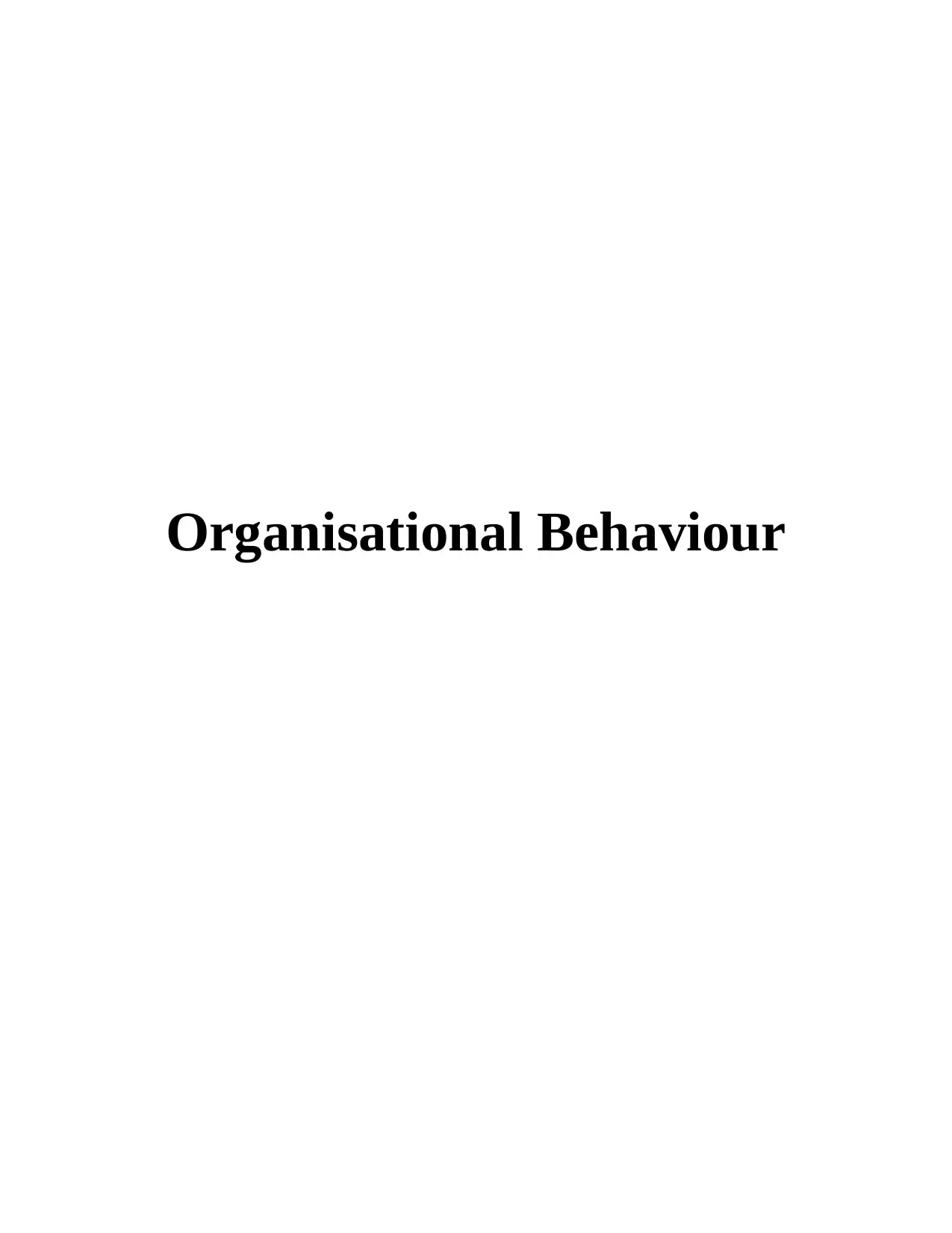
Organisational Behaviour
Secure Best Marks with AI Grader
Need help grading? Try our AI Grader for instant feedback on your assignments.
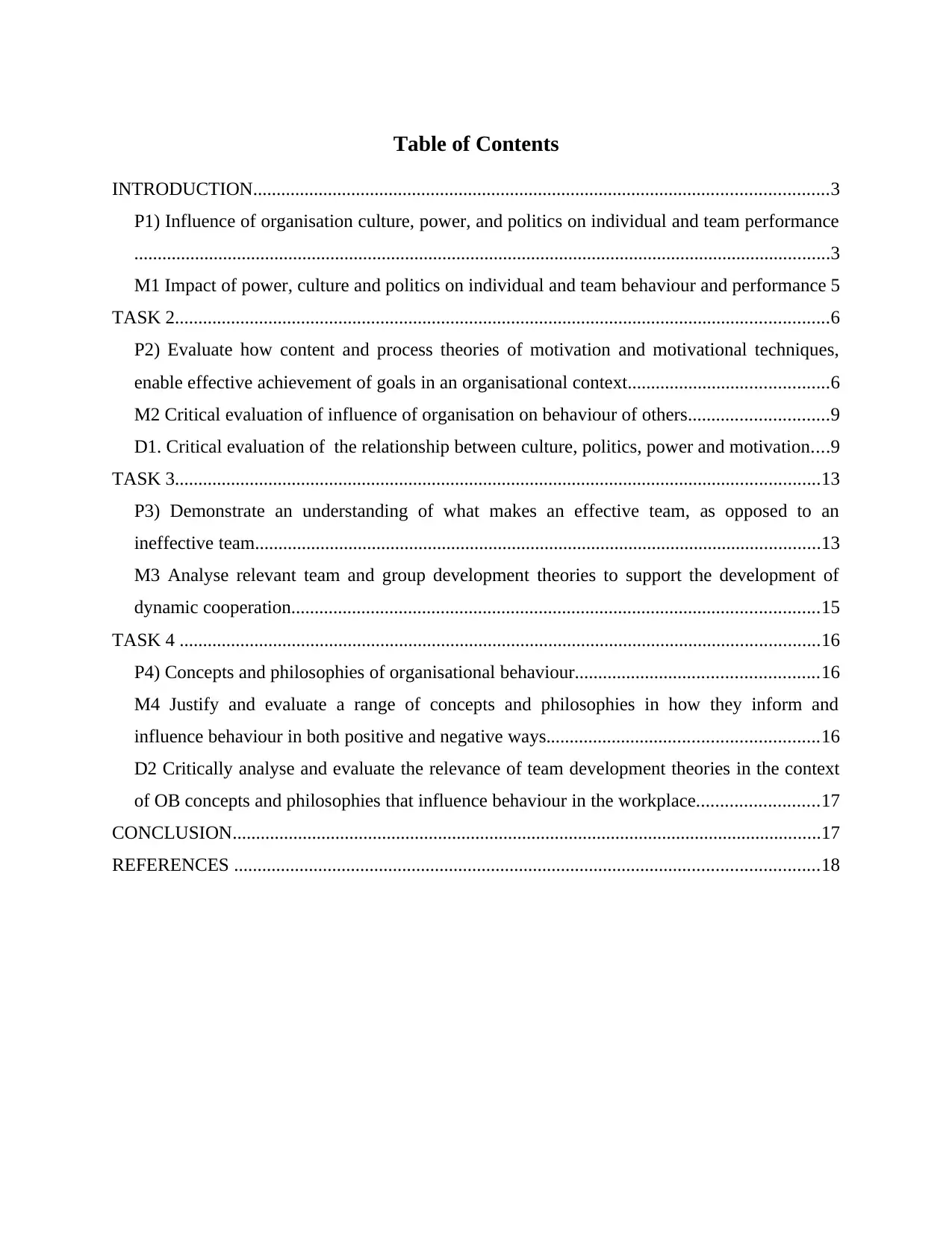
Table of Contents
INTRODUCTION...........................................................................................................................3
P1) Influence of organisation culture, power, and politics on individual and team performance
.....................................................................................................................................................3
M1 Impact of power, culture and politics on individual and team behaviour and performance 5
TASK 2............................................................................................................................................6
P2) Evaluate how content and process theories of motivation and motivational techniques,
enable effective achievement of goals in an organisational context...........................................6
M2 Critical evaluation of influence of organisation on behaviour of others..............................9
D1. Critical evaluation of the relationship between culture, politics, power and motivation....9
TASK 3..........................................................................................................................................13
P3) Demonstrate an understanding of what makes an effective team, as opposed to an
ineffective team.........................................................................................................................13
M3 Analyse relevant team and group development theories to support the development of
dynamic cooperation.................................................................................................................15
TASK 4 .........................................................................................................................................16
P4) Concepts and philosophies of organisational behaviour....................................................16
M4 Justify and evaluate a range of concepts and philosophies in how they inform and
influence behaviour in both positive and negative ways..........................................................16
D2 Critically analyse and evaluate the relevance of team development theories in the context
of OB concepts and philosophies that influence behaviour in the workplace..........................17
CONCLUSION..............................................................................................................................17
REFERENCES .............................................................................................................................18
INTRODUCTION...........................................................................................................................3
P1) Influence of organisation culture, power, and politics on individual and team performance
.....................................................................................................................................................3
M1 Impact of power, culture and politics on individual and team behaviour and performance 5
TASK 2............................................................................................................................................6
P2) Evaluate how content and process theories of motivation and motivational techniques,
enable effective achievement of goals in an organisational context...........................................6
M2 Critical evaluation of influence of organisation on behaviour of others..............................9
D1. Critical evaluation of the relationship between culture, politics, power and motivation....9
TASK 3..........................................................................................................................................13
P3) Demonstrate an understanding of what makes an effective team, as opposed to an
ineffective team.........................................................................................................................13
M3 Analyse relevant team and group development theories to support the development of
dynamic cooperation.................................................................................................................15
TASK 4 .........................................................................................................................................16
P4) Concepts and philosophies of organisational behaviour....................................................16
M4 Justify and evaluate a range of concepts and philosophies in how they inform and
influence behaviour in both positive and negative ways..........................................................16
D2 Critically analyse and evaluate the relevance of team development theories in the context
of OB concepts and philosophies that influence behaviour in the workplace..........................17
CONCLUSION..............................................................................................................................17
REFERENCES .............................................................................................................................18
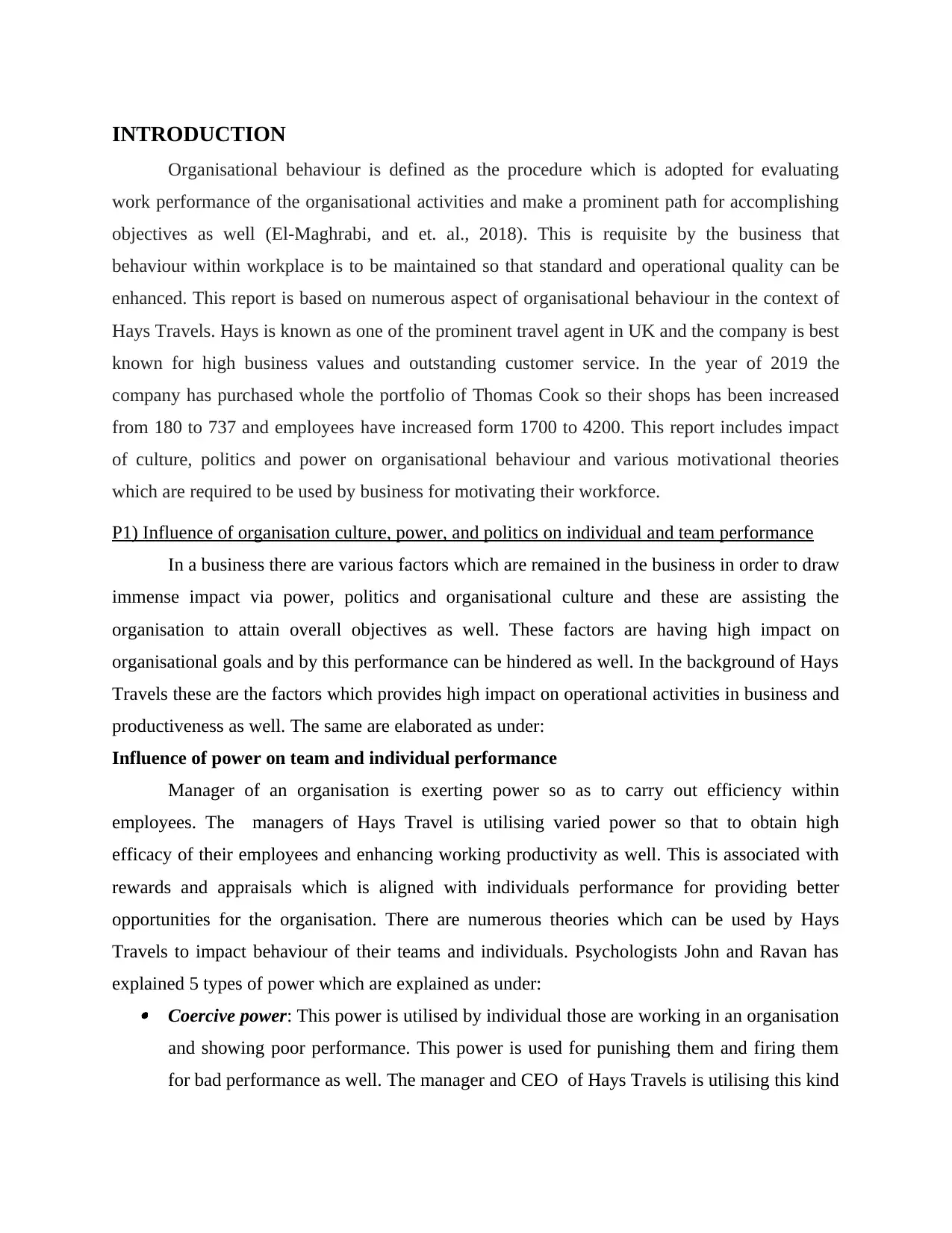
INTRODUCTION
Organisational behaviour is defined as the procedure which is adopted for evaluating
work performance of the organisational activities and make a prominent path for accomplishing
objectives as well (El-Maghrabi, and et. al., 2018). This is requisite by the business that
behaviour within workplace is to be maintained so that standard and operational quality can be
enhanced. This report is based on numerous aspect of organisational behaviour in the context of
Hays Travels. Hays is known as one of the prominent travel agent in UK and the company is best
known for high business values and outstanding customer service. In the year of 2019 the
company has purchased whole the portfolio of Thomas Cook so their shops has been increased
from 180 to 737 and employees have increased form 1700 to 4200. This report includes impact
of culture, politics and power on organisational behaviour and various motivational theories
which are required to be used by business for motivating their workforce.
P1) Influence of organisation culture, power, and politics on individual and team performance
In a business there are various factors which are remained in the business in order to draw
immense impact via power, politics and organisational culture and these are assisting the
organisation to attain overall objectives as well. These factors are having high impact on
organisational goals and by this performance can be hindered as well. In the background of Hays
Travels these are the factors which provides high impact on operational activities in business and
productiveness as well. The same are elaborated as under:
Influence of power on team and individual performance
Manager of an organisation is exerting power so as to carry out efficiency within
employees. The managers of Hays Travel is utilising varied power so that to obtain high
efficacy of their employees and enhancing working productivity as well. This is associated with
rewards and appraisals which is aligned with individuals performance for providing better
opportunities for the organisation. There are numerous theories which can be used by Hays
Travels to impact behaviour of their teams and individuals. Psychologists John and Ravan has
explained 5 types of power which are explained as under: Coercive power: This power is utilised by individual those are working in an organisation
and showing poor performance. This power is used for punishing them and firing them
for bad performance as well. The manager and CEO of Hays Travels is utilising this kind
Organisational behaviour is defined as the procedure which is adopted for evaluating
work performance of the organisational activities and make a prominent path for accomplishing
objectives as well (El-Maghrabi, and et. al., 2018). This is requisite by the business that
behaviour within workplace is to be maintained so that standard and operational quality can be
enhanced. This report is based on numerous aspect of organisational behaviour in the context of
Hays Travels. Hays is known as one of the prominent travel agent in UK and the company is best
known for high business values and outstanding customer service. In the year of 2019 the
company has purchased whole the portfolio of Thomas Cook so their shops has been increased
from 180 to 737 and employees have increased form 1700 to 4200. This report includes impact
of culture, politics and power on organisational behaviour and various motivational theories
which are required to be used by business for motivating their workforce.
P1) Influence of organisation culture, power, and politics on individual and team performance
In a business there are various factors which are remained in the business in order to draw
immense impact via power, politics and organisational culture and these are assisting the
organisation to attain overall objectives as well. These factors are having high impact on
organisational goals and by this performance can be hindered as well. In the background of Hays
Travels these are the factors which provides high impact on operational activities in business and
productiveness as well. The same are elaborated as under:
Influence of power on team and individual performance
Manager of an organisation is exerting power so as to carry out efficiency within
employees. The managers of Hays Travel is utilising varied power so that to obtain high
efficacy of their employees and enhancing working productivity as well. This is associated with
rewards and appraisals which is aligned with individuals performance for providing better
opportunities for the organisation. There are numerous theories which can be used by Hays
Travels to impact behaviour of their teams and individuals. Psychologists John and Ravan has
explained 5 types of power which are explained as under: Coercive power: This power is utilised by individual those are working in an organisation
and showing poor performance. This power is used for punishing them and firing them
for bad performance as well. The manager and CEO of Hays Travels is utilising this kind
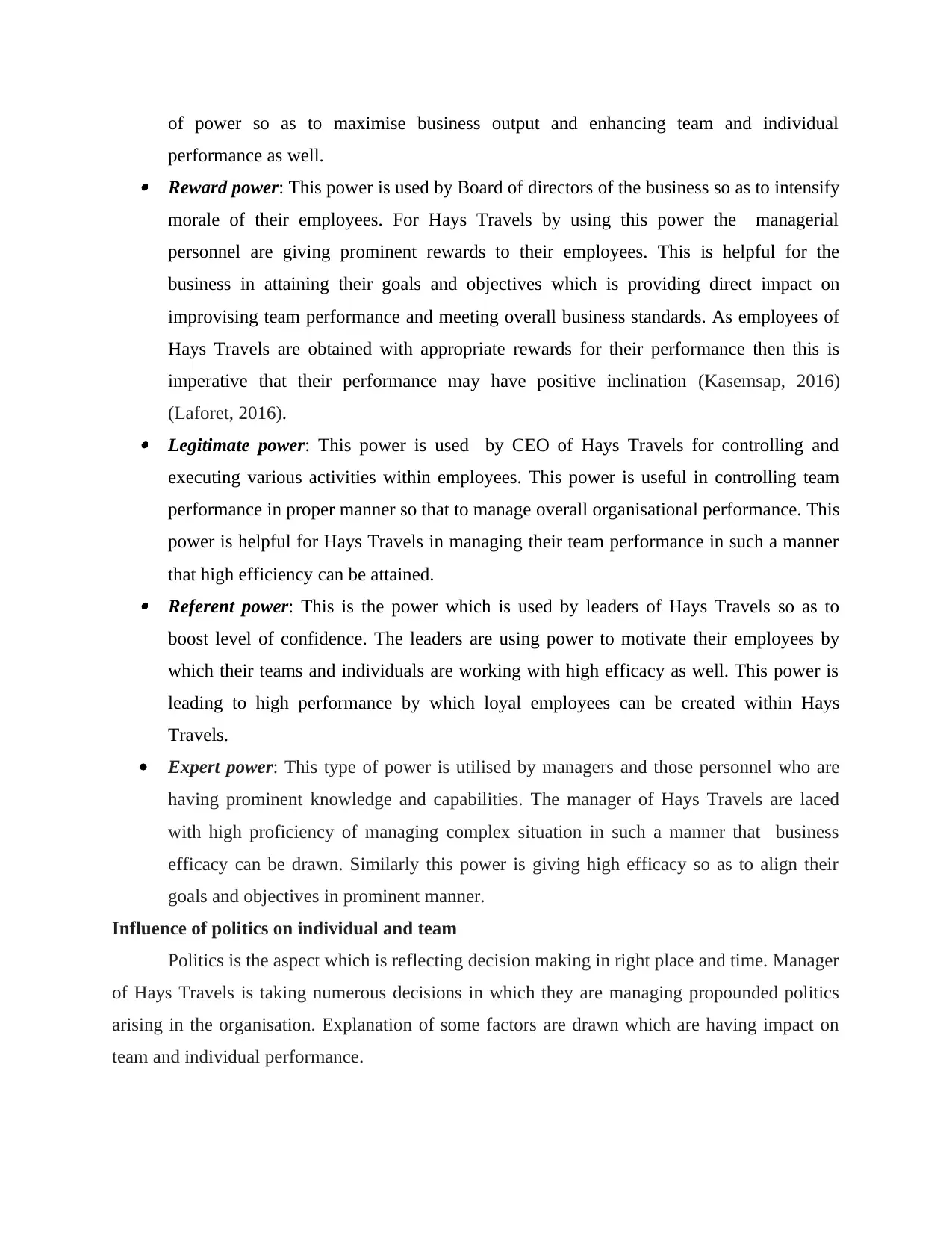
of power so as to maximise business output and enhancing team and individual
performance as well. Reward power: This power is used by Board of directors of the business so as to intensify
morale of their employees. For Hays Travels by using this power the managerial
personnel are giving prominent rewards to their employees. This is helpful for the
business in attaining their goals and objectives which is providing direct impact on
improvising team performance and meeting overall business standards. As employees of
Hays Travels are obtained with appropriate rewards for their performance then this is
imperative that their performance may have positive inclination (Kasemsap, 2016)
(Laforet, 2016). Legitimate power: This power is used by CEO of Hays Travels for controlling and
executing various activities within employees. This power is useful in controlling team
performance in proper manner so that to manage overall organisational performance. This
power is helpful for Hays Travels in managing their team performance in such a manner
that high efficiency can be attained. Referent power: This is the power which is used by leaders of Hays Travels so as to
boost level of confidence. The leaders are using power to motivate their employees by
which their teams and individuals are working with high efficacy as well. This power is
leading to high performance by which loyal employees can be created within Hays
Travels.
Expert power: This type of power is utilised by managers and those personnel who are
having prominent knowledge and capabilities. The manager of Hays Travels are laced
with high proficiency of managing complex situation in such a manner that business
efficacy can be drawn. Similarly this power is giving high efficacy so as to align their
goals and objectives in prominent manner.
Influence of politics on individual and team
Politics is the aspect which is reflecting decision making in right place and time. Manager
of Hays Travels is taking numerous decisions in which they are managing propounded politics
arising in the organisation. Explanation of some factors are drawn which are having impact on
team and individual performance.
performance as well. Reward power: This power is used by Board of directors of the business so as to intensify
morale of their employees. For Hays Travels by using this power the managerial
personnel are giving prominent rewards to their employees. This is helpful for the
business in attaining their goals and objectives which is providing direct impact on
improvising team performance and meeting overall business standards. As employees of
Hays Travels are obtained with appropriate rewards for their performance then this is
imperative that their performance may have positive inclination (Kasemsap, 2016)
(Laforet, 2016). Legitimate power: This power is used by CEO of Hays Travels for controlling and
executing various activities within employees. This power is useful in controlling team
performance in proper manner so that to manage overall organisational performance. This
power is helpful for Hays Travels in managing their team performance in such a manner
that high efficiency can be attained. Referent power: This is the power which is used by leaders of Hays Travels so as to
boost level of confidence. The leaders are using power to motivate their employees by
which their teams and individuals are working with high efficacy as well. This power is
leading to high performance by which loyal employees can be created within Hays
Travels.
Expert power: This type of power is utilised by managers and those personnel who are
having prominent knowledge and capabilities. The manager of Hays Travels are laced
with high proficiency of managing complex situation in such a manner that business
efficacy can be drawn. Similarly this power is giving high efficacy so as to align their
goals and objectives in prominent manner.
Influence of politics on individual and team
Politics is the aspect which is reflecting decision making in right place and time. Manager
of Hays Travels is taking numerous decisions in which they are managing propounded politics
arising in the organisation. Explanation of some factors are drawn which are having impact on
team and individual performance.
Secure Best Marks with AI Grader
Need help grading? Try our AI Grader for instant feedback on your assignments.
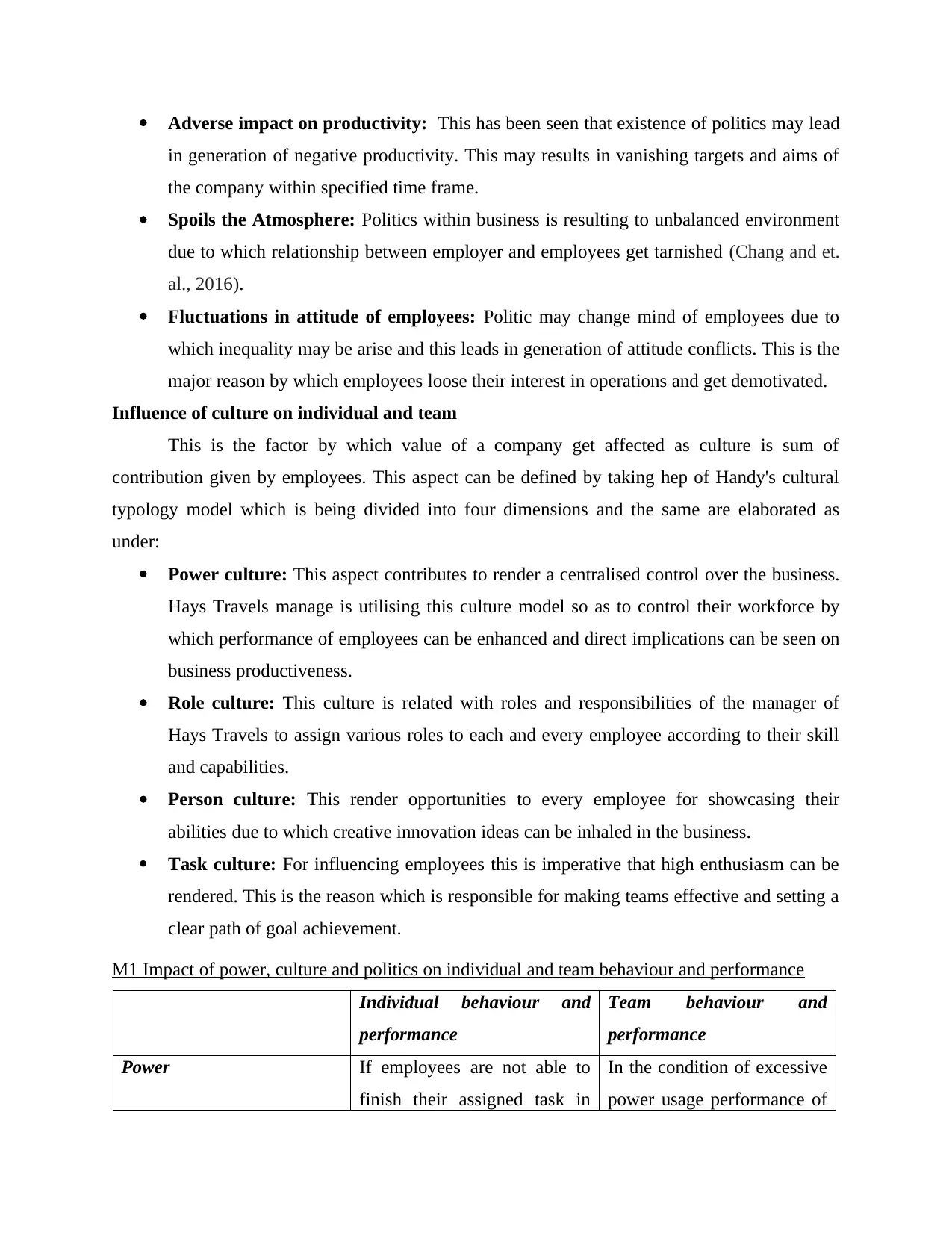
Adverse impact on productivity: This has been seen that existence of politics may lead
in generation of negative productivity. This may results in vanishing targets and aims of
the company within specified time frame.
Spoils the Atmosphere: Politics within business is resulting to unbalanced environment
due to which relationship between employer and employees get tarnished (Chang and et.
al., 2016).
Fluctuations in attitude of employees: Politic may change mind of employees due to
which inequality may be arise and this leads in generation of attitude conflicts. This is the
major reason by which employees loose their interest in operations and get demotivated.
Influence of culture on individual and team
This is the factor by which value of a company get affected as culture is sum of
contribution given by employees. This aspect can be defined by taking hep of Handy's cultural
typology model which is being divided into four dimensions and the same are elaborated as
under:
Power culture: This aspect contributes to render a centralised control over the business.
Hays Travels manage is utilising this culture model so as to control their workforce by
which performance of employees can be enhanced and direct implications can be seen on
business productiveness.
Role culture: This culture is related with roles and responsibilities of the manager of
Hays Travels to assign various roles to each and every employee according to their skill
and capabilities.
Person culture: This render opportunities to every employee for showcasing their
abilities due to which creative innovation ideas can be inhaled in the business.
Task culture: For influencing employees this is imperative that high enthusiasm can be
rendered. This is the reason which is responsible for making teams effective and setting a
clear path of goal achievement.
M1 Impact of power, culture and politics on individual and team behaviour and performance
Individual behaviour and
performance
Team behaviour and
performance
Power If employees are not able to
finish their assigned task in
In the condition of excessive
power usage performance of
in generation of negative productivity. This may results in vanishing targets and aims of
the company within specified time frame.
Spoils the Atmosphere: Politics within business is resulting to unbalanced environment
due to which relationship between employer and employees get tarnished (Chang and et.
al., 2016).
Fluctuations in attitude of employees: Politic may change mind of employees due to
which inequality may be arise and this leads in generation of attitude conflicts. This is the
major reason by which employees loose their interest in operations and get demotivated.
Influence of culture on individual and team
This is the factor by which value of a company get affected as culture is sum of
contribution given by employees. This aspect can be defined by taking hep of Handy's cultural
typology model which is being divided into four dimensions and the same are elaborated as
under:
Power culture: This aspect contributes to render a centralised control over the business.
Hays Travels manage is utilising this culture model so as to control their workforce by
which performance of employees can be enhanced and direct implications can be seen on
business productiveness.
Role culture: This culture is related with roles and responsibilities of the manager of
Hays Travels to assign various roles to each and every employee according to their skill
and capabilities.
Person culture: This render opportunities to every employee for showcasing their
abilities due to which creative innovation ideas can be inhaled in the business.
Task culture: For influencing employees this is imperative that high enthusiasm can be
rendered. This is the reason which is responsible for making teams effective and setting a
clear path of goal achievement.
M1 Impact of power, culture and politics on individual and team behaviour and performance
Individual behaviour and
performance
Team behaviour and
performance
Power If employees are not able to
finish their assigned task in
In the condition of excessive
power usage performance of
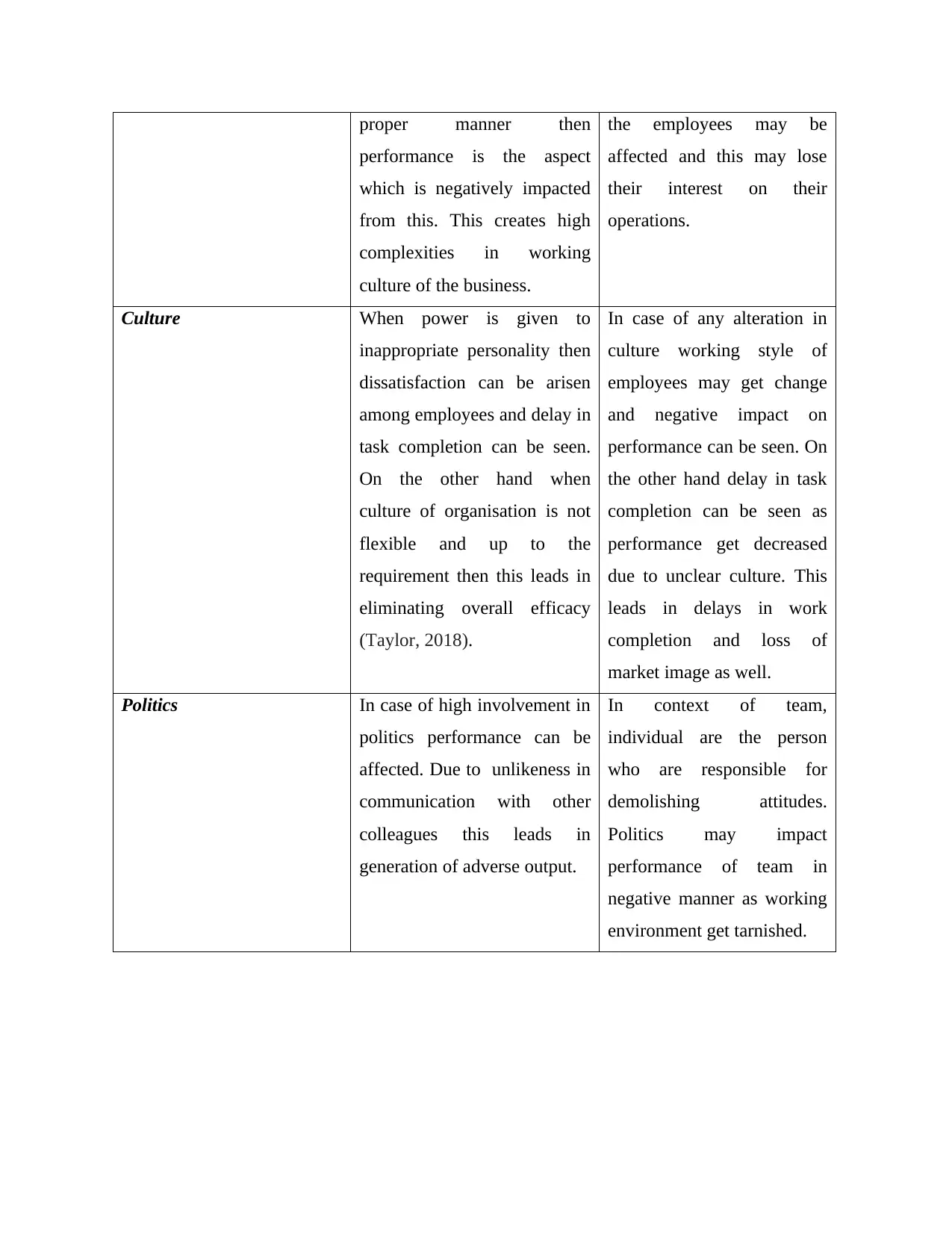
proper manner then
performance is the aspect
which is negatively impacted
from this. This creates high
complexities in working
culture of the business.
the employees may be
affected and this may lose
their interest on their
operations.
Culture When power is given to
inappropriate personality then
dissatisfaction can be arisen
among employees and delay in
task completion can be seen.
On the other hand when
culture of organisation is not
flexible and up to the
requirement then this leads in
eliminating overall efficacy
(Taylor, 2018).
In case of any alteration in
culture working style of
employees may get change
and negative impact on
performance can be seen. On
the other hand delay in task
completion can be seen as
performance get decreased
due to unclear culture. This
leads in delays in work
completion and loss of
market image as well.
Politics In case of high involvement in
politics performance can be
affected. Due to unlikeness in
communication with other
colleagues this leads in
generation of adverse output.
In context of team,
individual are the person
who are responsible for
demolishing attitudes.
Politics may impact
performance of team in
negative manner as working
environment get tarnished.
performance is the aspect
which is negatively impacted
from this. This creates high
complexities in working
culture of the business.
the employees may be
affected and this may lose
their interest on their
operations.
Culture When power is given to
inappropriate personality then
dissatisfaction can be arisen
among employees and delay in
task completion can be seen.
On the other hand when
culture of organisation is not
flexible and up to the
requirement then this leads in
eliminating overall efficacy
(Taylor, 2018).
In case of any alteration in
culture working style of
employees may get change
and negative impact on
performance can be seen. On
the other hand delay in task
completion can be seen as
performance get decreased
due to unclear culture. This
leads in delays in work
completion and loss of
market image as well.
Politics In case of high involvement in
politics performance can be
affected. Due to unlikeness in
communication with other
colleagues this leads in
generation of adverse output.
In context of team,
individual are the person
who are responsible for
demolishing attitudes.
Politics may impact
performance of team in
negative manner as working
environment get tarnished.
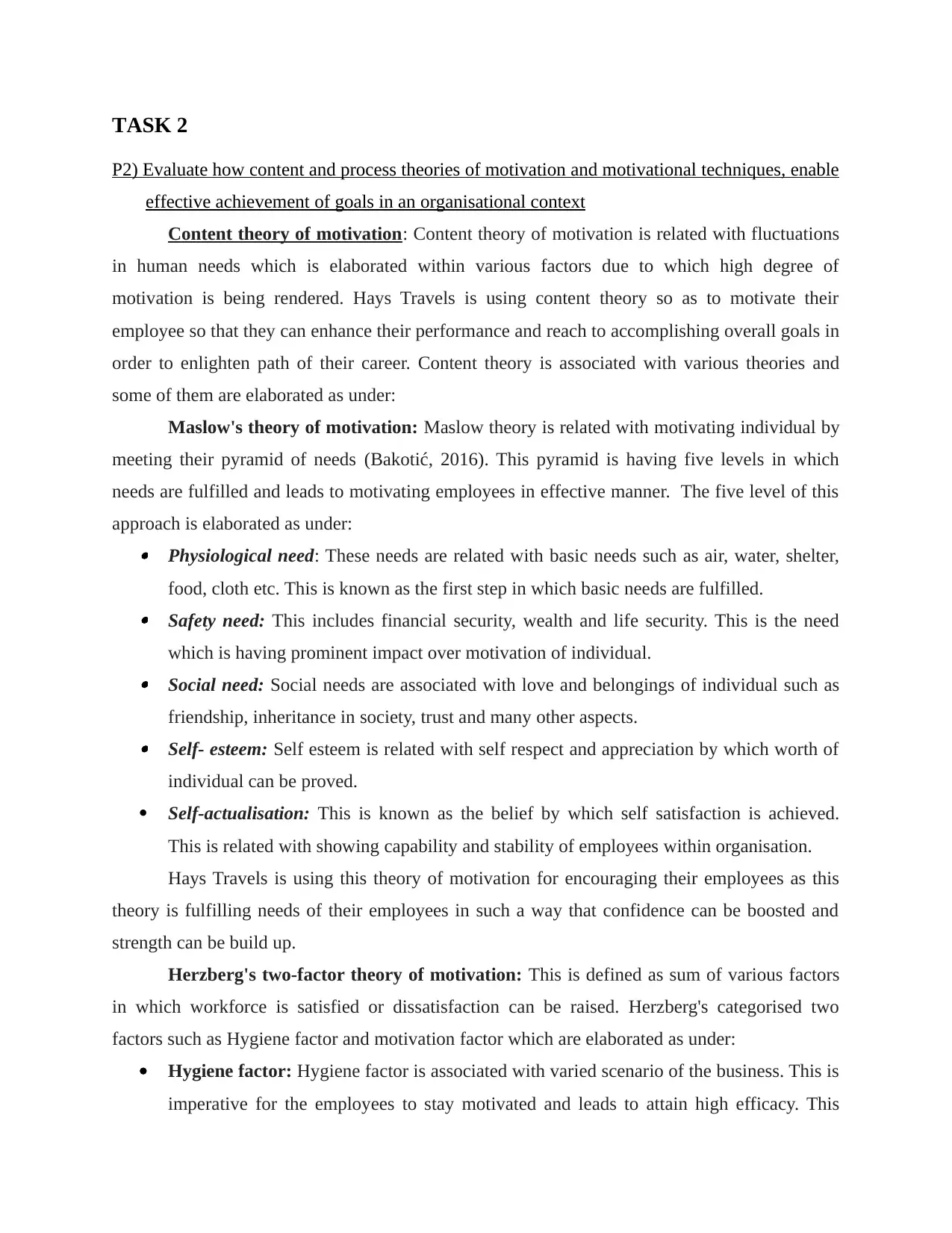
TASK 2
P2) Evaluate how content and process theories of motivation and motivational techniques, enable
effective achievement of goals in an organisational context
Content theory of motivation: Content theory of motivation is related with fluctuations
in human needs which is elaborated within various factors due to which high degree of
motivation is being rendered. Hays Travels is using content theory so as to motivate their
employee so that they can enhance their performance and reach to accomplishing overall goals in
order to enlighten path of their career. Content theory is associated with various theories and
some of them are elaborated as under:
Maslow's theory of motivation: Maslow theory is related with motivating individual by
meeting their pyramid of needs (Bakotić, 2016). This pyramid is having five levels in which
needs are fulfilled and leads to motivating employees in effective manner. The five level of this
approach is elaborated as under: Physiological need: These needs are related with basic needs such as air, water, shelter,
food, cloth etc. This is known as the first step in which basic needs are fulfilled. Safety need: This includes financial security, wealth and life security. This is the need
which is having prominent impact over motivation of individual. Social need: Social needs are associated with love and belongings of individual such as
friendship, inheritance in society, trust and many other aspects. Self- esteem: Self esteem is related with self respect and appreciation by which worth of
individual can be proved.
Self-actualisation: This is known as the belief by which self satisfaction is achieved.
This is related with showing capability and stability of employees within organisation.
Hays Travels is using this theory of motivation for encouraging their employees as this
theory is fulfilling needs of their employees in such a way that confidence can be boosted and
strength can be build up.
Herzberg's two-factor theory of motivation: This is defined as sum of various factors
in which workforce is satisfied or dissatisfaction can be raised. Herzberg's categorised two
factors such as Hygiene factor and motivation factor which are elaborated as under:
Hygiene factor: Hygiene factor is associated with varied scenario of the business. This is
imperative for the employees to stay motivated and leads to attain high efficacy. This
P2) Evaluate how content and process theories of motivation and motivational techniques, enable
effective achievement of goals in an organisational context
Content theory of motivation: Content theory of motivation is related with fluctuations
in human needs which is elaborated within various factors due to which high degree of
motivation is being rendered. Hays Travels is using content theory so as to motivate their
employee so that they can enhance their performance and reach to accomplishing overall goals in
order to enlighten path of their career. Content theory is associated with various theories and
some of them are elaborated as under:
Maslow's theory of motivation: Maslow theory is related with motivating individual by
meeting their pyramid of needs (Bakotić, 2016). This pyramid is having five levels in which
needs are fulfilled and leads to motivating employees in effective manner. The five level of this
approach is elaborated as under: Physiological need: These needs are related with basic needs such as air, water, shelter,
food, cloth etc. This is known as the first step in which basic needs are fulfilled. Safety need: This includes financial security, wealth and life security. This is the need
which is having prominent impact over motivation of individual. Social need: Social needs are associated with love and belongings of individual such as
friendship, inheritance in society, trust and many other aspects. Self- esteem: Self esteem is related with self respect and appreciation by which worth of
individual can be proved.
Self-actualisation: This is known as the belief by which self satisfaction is achieved.
This is related with showing capability and stability of employees within organisation.
Hays Travels is using this theory of motivation for encouraging their employees as this
theory is fulfilling needs of their employees in such a way that confidence can be boosted and
strength can be build up.
Herzberg's two-factor theory of motivation: This is defined as sum of various factors
in which workforce is satisfied or dissatisfaction can be raised. Herzberg's categorised two
factors such as Hygiene factor and motivation factor which are elaborated as under:
Hygiene factor: Hygiene factor is associated with varied scenario of the business. This is
imperative for the employees to stay motivated and leads to attain high efficacy. This
Paraphrase This Document
Need a fresh take? Get an instant paraphrase of this document with our AI Paraphraser
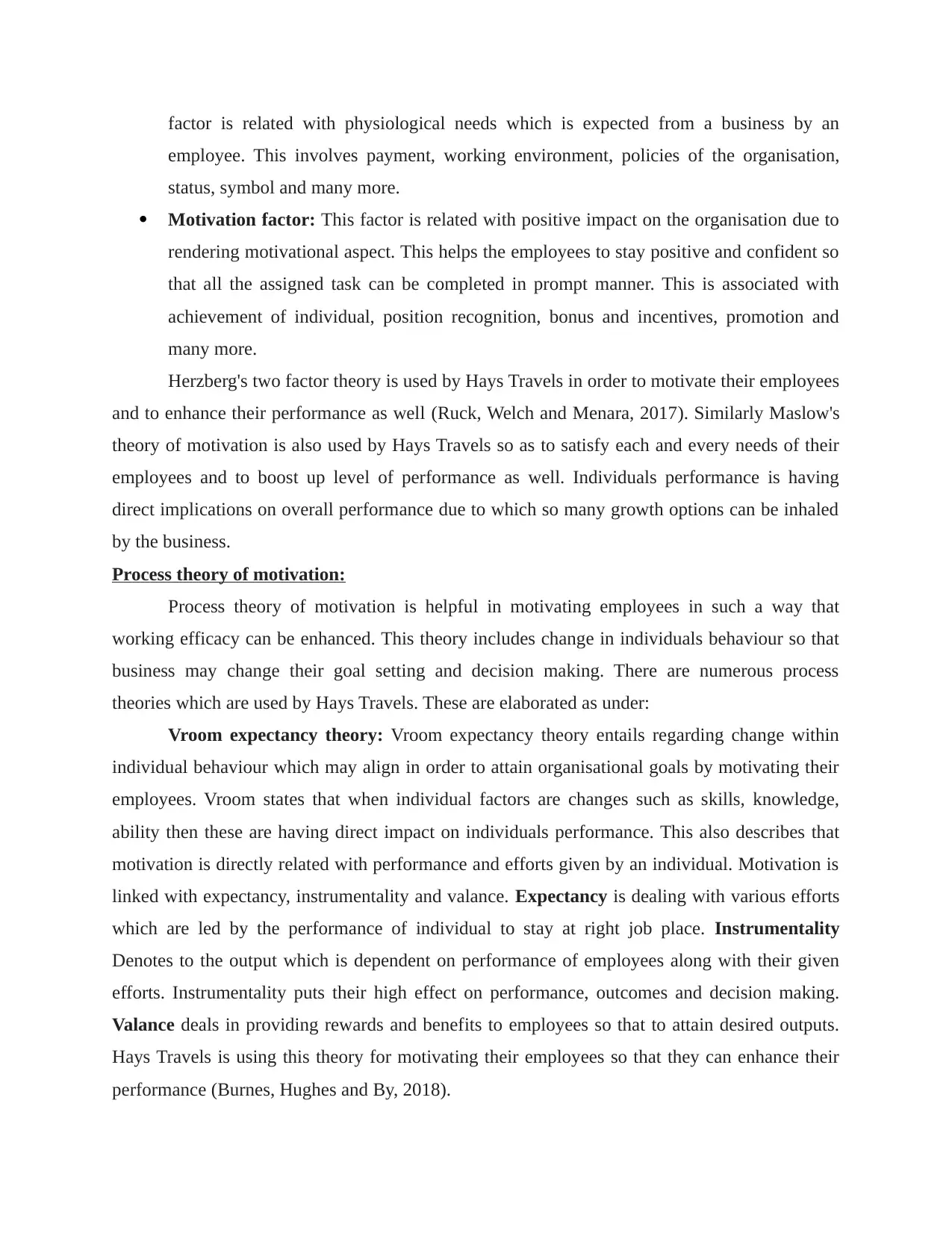
factor is related with physiological needs which is expected from a business by an
employee. This involves payment, working environment, policies of the organisation,
status, symbol and many more.
Motivation factor: This factor is related with positive impact on the organisation due to
rendering motivational aspect. This helps the employees to stay positive and confident so
that all the assigned task can be completed in prompt manner. This is associated with
achievement of individual, position recognition, bonus and incentives, promotion and
many more.
Herzberg's two factor theory is used by Hays Travels in order to motivate their employees
and to enhance their performance as well (Ruck, Welch and Menara, 2017). Similarly Maslow's
theory of motivation is also used by Hays Travels so as to satisfy each and every needs of their
employees and to boost up level of performance as well. Individuals performance is having
direct implications on overall performance due to which so many growth options can be inhaled
by the business.
Process theory of motivation:
Process theory of motivation is helpful in motivating employees in such a way that
working efficacy can be enhanced. This theory includes change in individuals behaviour so that
business may change their goal setting and decision making. There are numerous process
theories which are used by Hays Travels. These are elaborated as under:
Vroom expectancy theory: Vroom expectancy theory entails regarding change within
individual behaviour which may align in order to attain organisational goals by motivating their
employees. Vroom states that when individual factors are changes such as skills, knowledge,
ability then these are having direct impact on individuals performance. This also describes that
motivation is directly related with performance and efforts given by an individual. Motivation is
linked with expectancy, instrumentality and valance. Expectancy is dealing with various efforts
which are led by the performance of individual to stay at right job place. Instrumentality
Denotes to the output which is dependent on performance of employees along with their given
efforts. Instrumentality puts their high effect on performance, outcomes and decision making.
Valance deals in providing rewards and benefits to employees so that to attain desired outputs.
Hays Travels is using this theory for motivating their employees so that they can enhance their
performance (Burnes, Hughes and By, 2018).
employee. This involves payment, working environment, policies of the organisation,
status, symbol and many more.
Motivation factor: This factor is related with positive impact on the organisation due to
rendering motivational aspect. This helps the employees to stay positive and confident so
that all the assigned task can be completed in prompt manner. This is associated with
achievement of individual, position recognition, bonus and incentives, promotion and
many more.
Herzberg's two factor theory is used by Hays Travels in order to motivate their employees
and to enhance their performance as well (Ruck, Welch and Menara, 2017). Similarly Maslow's
theory of motivation is also used by Hays Travels so as to satisfy each and every needs of their
employees and to boost up level of performance as well. Individuals performance is having
direct implications on overall performance due to which so many growth options can be inhaled
by the business.
Process theory of motivation:
Process theory of motivation is helpful in motivating employees in such a way that
working efficacy can be enhanced. This theory includes change in individuals behaviour so that
business may change their goal setting and decision making. There are numerous process
theories which are used by Hays Travels. These are elaborated as under:
Vroom expectancy theory: Vroom expectancy theory entails regarding change within
individual behaviour which may align in order to attain organisational goals by motivating their
employees. Vroom states that when individual factors are changes such as skills, knowledge,
ability then these are having direct impact on individuals performance. This also describes that
motivation is directly related with performance and efforts given by an individual. Motivation is
linked with expectancy, instrumentality and valance. Expectancy is dealing with various efforts
which are led by the performance of individual to stay at right job place. Instrumentality
Denotes to the output which is dependent on performance of employees along with their given
efforts. Instrumentality puts their high effect on performance, outcomes and decision making.
Valance deals in providing rewards and benefits to employees so that to attain desired outputs.
Hays Travels is using this theory for motivating their employees so that they can enhance their
performance (Burnes, Hughes and By, 2018).
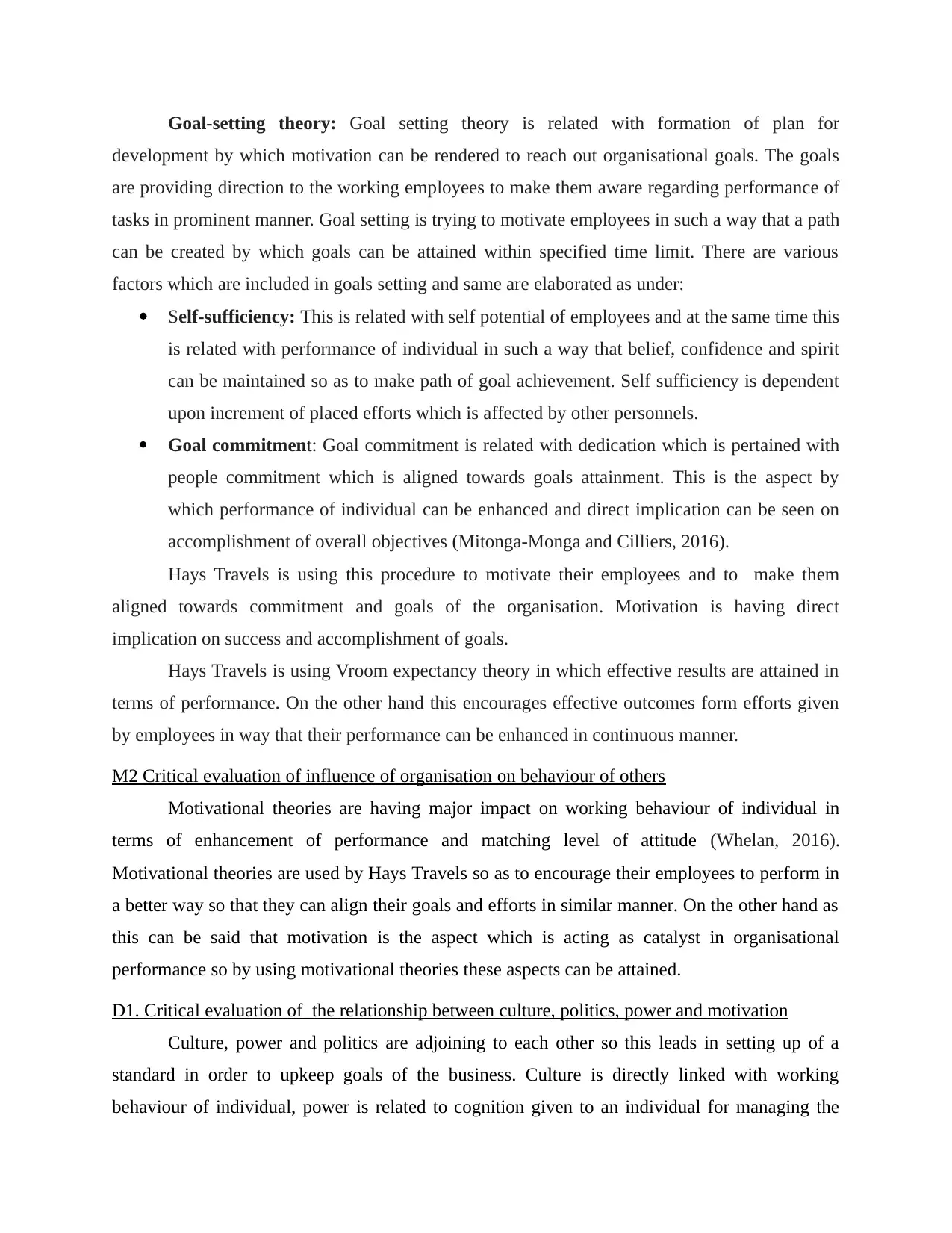
Goal-setting theory: Goal setting theory is related with formation of plan for
development by which motivation can be rendered to reach out organisational goals. The goals
are providing direction to the working employees to make them aware regarding performance of
tasks in prominent manner. Goal setting is trying to motivate employees in such a way that a path
can be created by which goals can be attained within specified time limit. There are various
factors which are included in goals setting and same are elaborated as under:
Self-sufficiency: This is related with self potential of employees and at the same time this
is related with performance of individual in such a way that belief, confidence and spirit
can be maintained so as to make path of goal achievement. Self sufficiency is dependent
upon increment of placed efforts which is affected by other personnels.
Goal commitment: Goal commitment is related with dedication which is pertained with
people commitment which is aligned towards goals attainment. This is the aspect by
which performance of individual can be enhanced and direct implication can be seen on
accomplishment of overall objectives (Mitonga-Monga and Cilliers, 2016).
Hays Travels is using this procedure to motivate their employees and to make them
aligned towards commitment and goals of the organisation. Motivation is having direct
implication on success and accomplishment of goals.
Hays Travels is using Vroom expectancy theory in which effective results are attained in
terms of performance. On the other hand this encourages effective outcomes form efforts given
by employees in way that their performance can be enhanced in continuous manner.
M2 Critical evaluation of influence of organisation on behaviour of others
Motivational theories are having major impact on working behaviour of individual in
terms of enhancement of performance and matching level of attitude (Whelan, 2016).
Motivational theories are used by Hays Travels so as to encourage their employees to perform in
a better way so that they can align their goals and efforts in similar manner. On the other hand as
this can be said that motivation is the aspect which is acting as catalyst in organisational
performance so by using motivational theories these aspects can be attained.
D1. Critical evaluation of the relationship between culture, politics, power and motivation
Culture, power and politics are adjoining to each other so this leads in setting up of a
standard in order to upkeep goals of the business. Culture is directly linked with working
behaviour of individual, power is related to cognition given to an individual for managing the
development by which motivation can be rendered to reach out organisational goals. The goals
are providing direction to the working employees to make them aware regarding performance of
tasks in prominent manner. Goal setting is trying to motivate employees in such a way that a path
can be created by which goals can be attained within specified time limit. There are various
factors which are included in goals setting and same are elaborated as under:
Self-sufficiency: This is related with self potential of employees and at the same time this
is related with performance of individual in such a way that belief, confidence and spirit
can be maintained so as to make path of goal achievement. Self sufficiency is dependent
upon increment of placed efforts which is affected by other personnels.
Goal commitment: Goal commitment is related with dedication which is pertained with
people commitment which is aligned towards goals attainment. This is the aspect by
which performance of individual can be enhanced and direct implication can be seen on
accomplishment of overall objectives (Mitonga-Monga and Cilliers, 2016).
Hays Travels is using this procedure to motivate their employees and to make them
aligned towards commitment and goals of the organisation. Motivation is having direct
implication on success and accomplishment of goals.
Hays Travels is using Vroom expectancy theory in which effective results are attained in
terms of performance. On the other hand this encourages effective outcomes form efforts given
by employees in way that their performance can be enhanced in continuous manner.
M2 Critical evaluation of influence of organisation on behaviour of others
Motivational theories are having major impact on working behaviour of individual in
terms of enhancement of performance and matching level of attitude (Whelan, 2016).
Motivational theories are used by Hays Travels so as to encourage their employees to perform in
a better way so that they can align their goals and efforts in similar manner. On the other hand as
this can be said that motivation is the aspect which is acting as catalyst in organisational
performance so by using motivational theories these aspects can be attained.
D1. Critical evaluation of the relationship between culture, politics, power and motivation
Culture, power and politics are adjoining to each other so this leads in setting up of a
standard in order to upkeep goals of the business. Culture is directly linked with working
behaviour of individual, power is related to cognition given to an individual for managing the
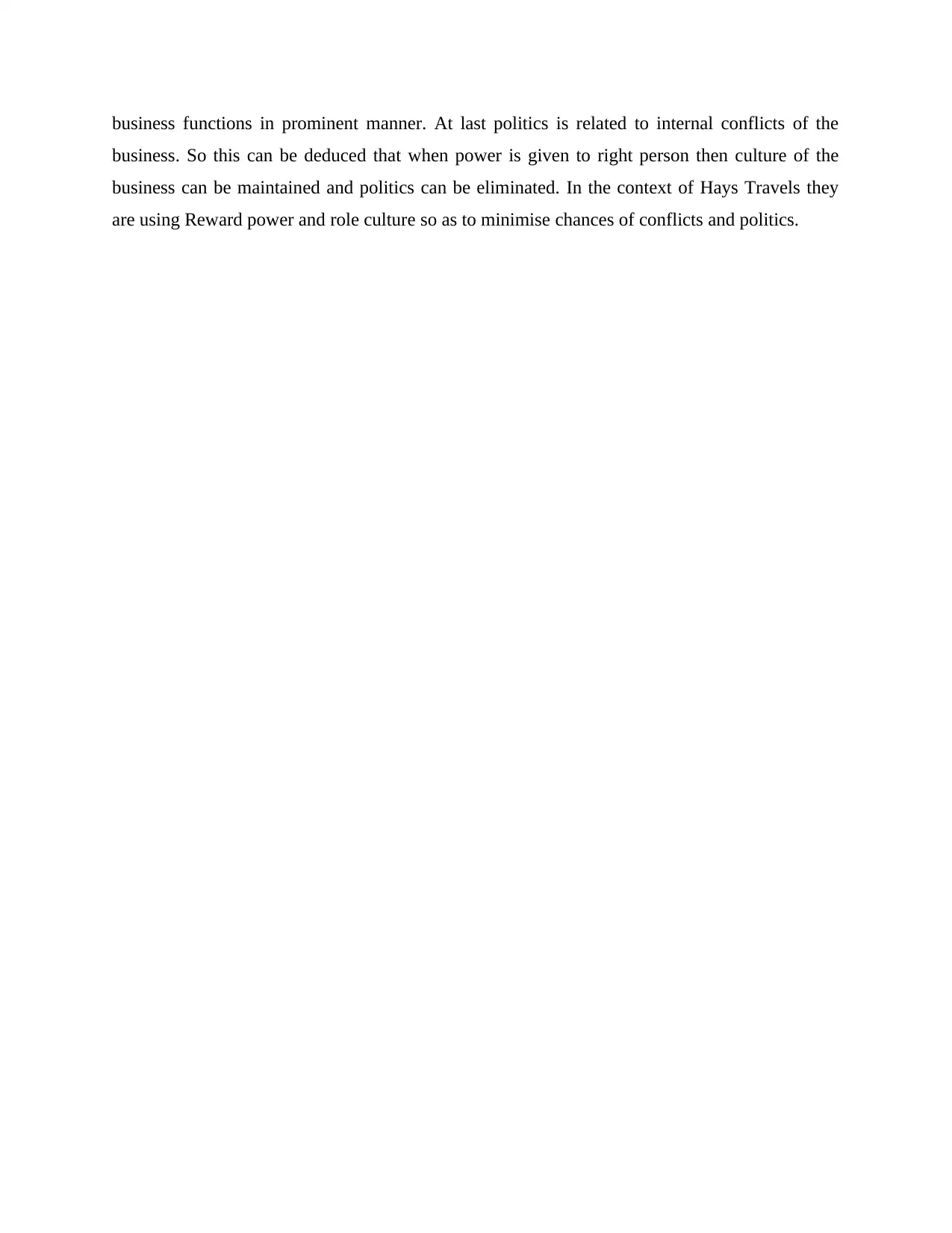
business functions in prominent manner. At last politics is related to internal conflicts of the
business. So this can be deduced that when power is given to right person then culture of the
business can be maintained and politics can be eliminated. In the context of Hays Travels they
are using Reward power and role culture so as to minimise chances of conflicts and politics.
business. So this can be deduced that when power is given to right person then culture of the
business can be maintained and politics can be eliminated. In the context of Hays Travels they
are using Reward power and role culture so as to minimise chances of conflicts and politics.
Secure Best Marks with AI Grader
Need help grading? Try our AI Grader for instant feedback on your assignments.


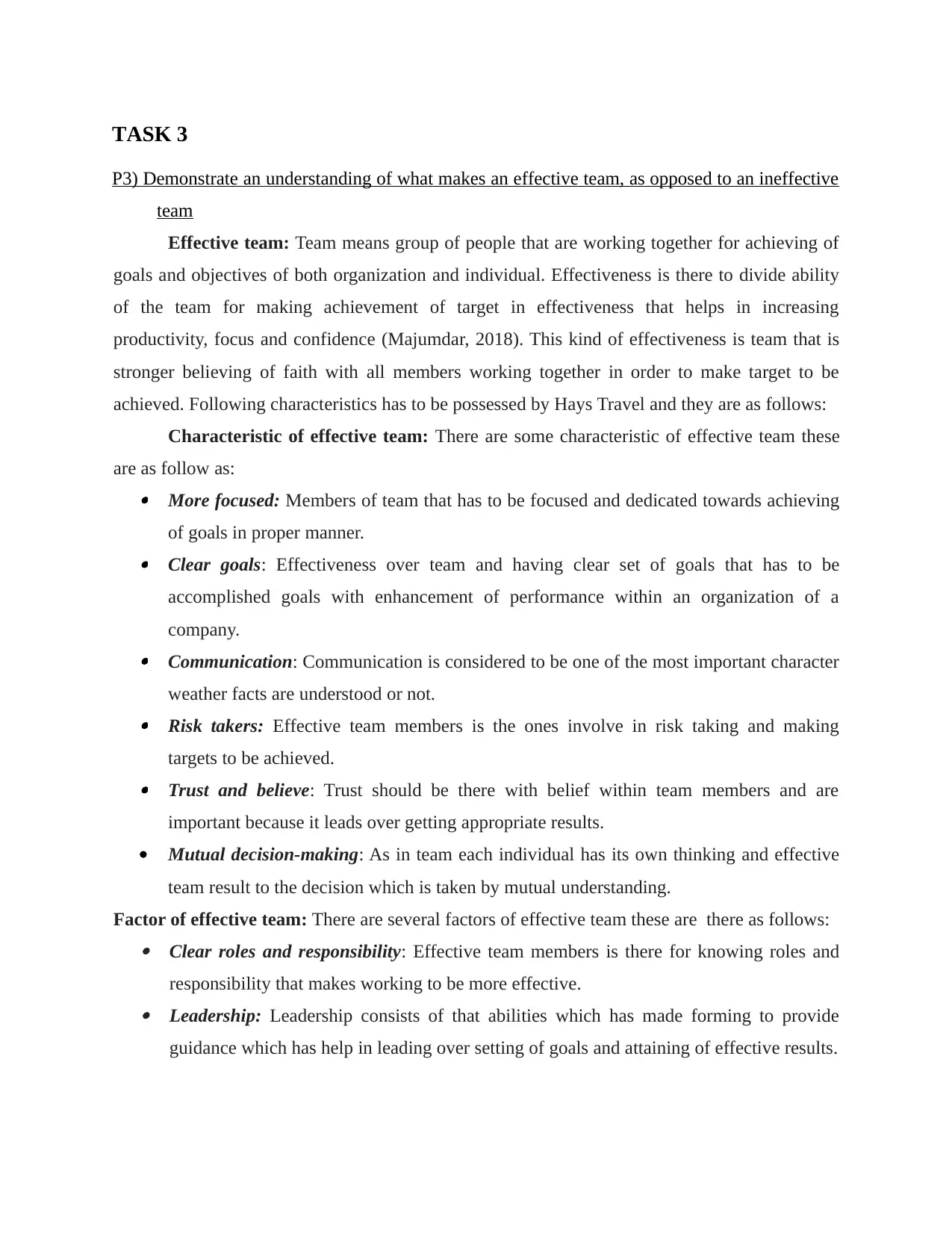
TASK 3
P3) Demonstrate an understanding of what makes an effective team, as opposed to an ineffective
team
Effective team: Team means group of people that are working together for achieving of
goals and objectives of both organization and individual. Effectiveness is there to divide ability
of the team for making achievement of target in effectiveness that helps in increasing
productivity, focus and confidence (Majumdar, 2018). This kind of effectiveness is team that is
stronger believing of faith with all members working together in order to make target to be
achieved. Following characteristics has to be possessed by Hays Travel and they are as follows:
Characteristic of effective team: There are some characteristic of effective team these
are as follow as: More focused: Members of team that has to be focused and dedicated towards achieving
of goals in proper manner. Clear goals: Effectiveness over team and having clear set of goals that has to be
accomplished goals with enhancement of performance within an organization of a
company. Communication: Communication is considered to be one of the most important character
weather facts are understood or not. Risk takers: Effective team members is the ones involve in risk taking and making
targets to be achieved. Trust and believe: Trust should be there with belief within team members and are
important because it leads over getting appropriate results.
Mutual decision-making: As in team each individual has its own thinking and effective
team result to the decision which is taken by mutual understanding.
Factor of effective team: There are several factors of effective team these are there as follows: Clear roles and responsibility: Effective team members is there for knowing roles and
responsibility that makes working to be more effective. Leadership: Leadership consists of that abilities which has made forming to provide
guidance which has help in leading over setting of goals and attaining of effective results.
P3) Demonstrate an understanding of what makes an effective team, as opposed to an ineffective
team
Effective team: Team means group of people that are working together for achieving of
goals and objectives of both organization and individual. Effectiveness is there to divide ability
of the team for making achievement of target in effectiveness that helps in increasing
productivity, focus and confidence (Majumdar, 2018). This kind of effectiveness is team that is
stronger believing of faith with all members working together in order to make target to be
achieved. Following characteristics has to be possessed by Hays Travel and they are as follows:
Characteristic of effective team: There are some characteristic of effective team these
are as follow as: More focused: Members of team that has to be focused and dedicated towards achieving
of goals in proper manner. Clear goals: Effectiveness over team and having clear set of goals that has to be
accomplished goals with enhancement of performance within an organization of a
company. Communication: Communication is considered to be one of the most important character
weather facts are understood or not. Risk takers: Effective team members is the ones involve in risk taking and making
targets to be achieved. Trust and believe: Trust should be there with belief within team members and are
important because it leads over getting appropriate results.
Mutual decision-making: As in team each individual has its own thinking and effective
team result to the decision which is taken by mutual understanding.
Factor of effective team: There are several factors of effective team these are there as follows: Clear roles and responsibility: Effective team members is there for knowing roles and
responsibility that makes working to be more effective. Leadership: Leadership consists of that abilities which has made forming to provide
guidance which has help in leading over setting of goals and attaining of effective results.
Paraphrase This Document
Need a fresh take? Get an instant paraphrase of this document with our AI Paraphraser
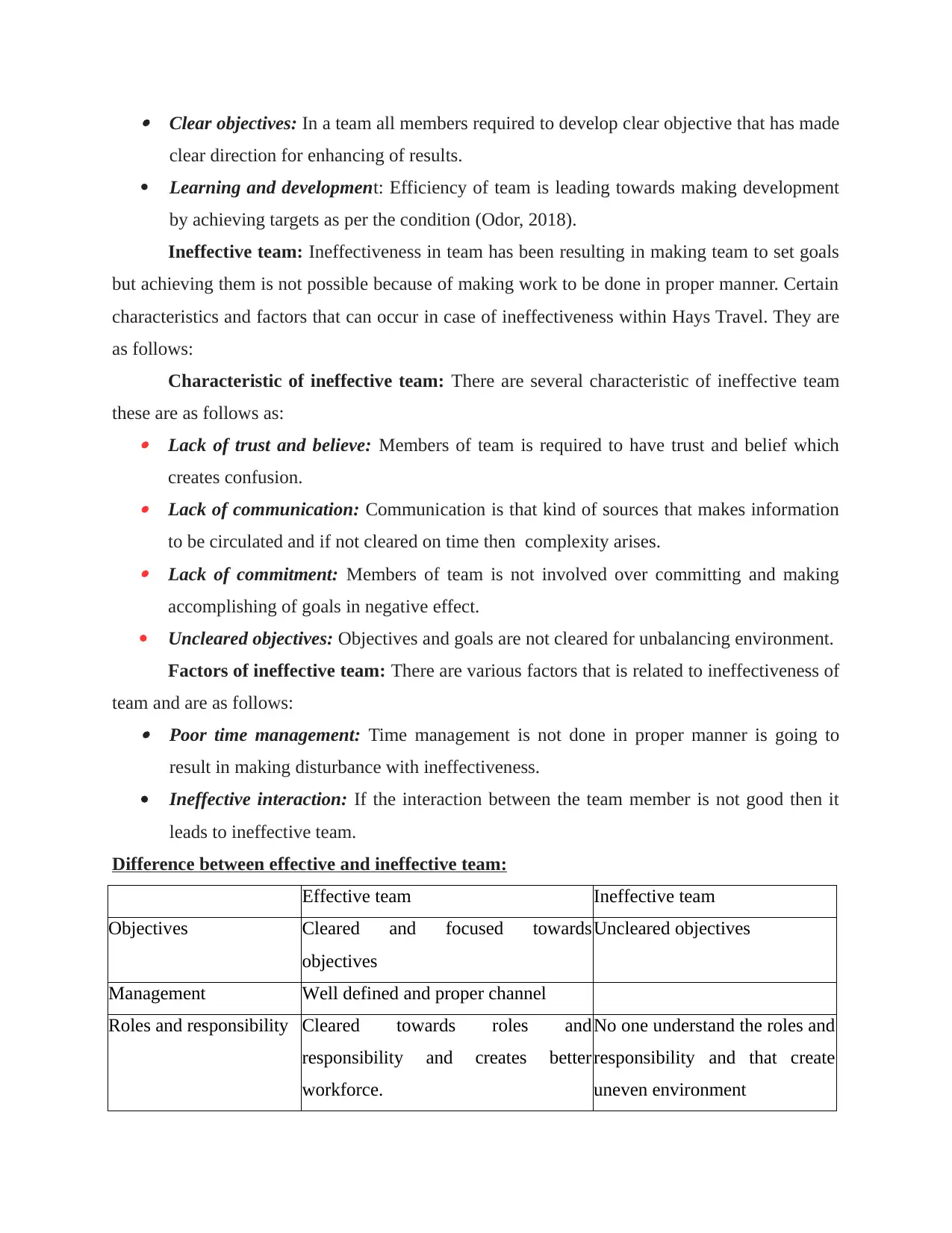
Clear objectives: In a team all members required to develop clear objective that has made
clear direction for enhancing of results.
Learning and development: Efficiency of team is leading towards making development
by achieving targets as per the condition (Odor, 2018).
Ineffective team: Ineffectiveness in team has been resulting in making team to set goals
but achieving them is not possible because of making work to be done in proper manner. Certain
characteristics and factors that can occur in case of ineffectiveness within Hays Travel. They are
as follows:
Characteristic of ineffective team: There are several characteristic of ineffective team
these are as follows as: Lack of trust and believe: Members of team is required to have trust and belief which
creates confusion. Lack of communication: Communication is that kind of sources that makes information
to be circulated and if not cleared on time then complexity arises. Lack of commitment: Members of team is not involved over committing and making
accomplishing of goals in negative effect.
Uncleared objectives: Objectives and goals are not cleared for unbalancing environment.
Factors of ineffective team: There are various factors that is related to ineffectiveness of
team and are as follows: Poor time management: Time management is not done in proper manner is going to
result in making disturbance with ineffectiveness.
Ineffective interaction: If the interaction between the team member is not good then it
leads to ineffective team.
Difference between effective and ineffective team:
Effective team Ineffective team
Objectives Cleared and focused towards
objectives
Uncleared objectives
Management Well defined and proper channel
Roles and responsibility Cleared towards roles and
responsibility and creates better
workforce.
No one understand the roles and
responsibility and that create
uneven environment
clear direction for enhancing of results.
Learning and development: Efficiency of team is leading towards making development
by achieving targets as per the condition (Odor, 2018).
Ineffective team: Ineffectiveness in team has been resulting in making team to set goals
but achieving them is not possible because of making work to be done in proper manner. Certain
characteristics and factors that can occur in case of ineffectiveness within Hays Travel. They are
as follows:
Characteristic of ineffective team: There are several characteristic of ineffective team
these are as follows as: Lack of trust and believe: Members of team is required to have trust and belief which
creates confusion. Lack of communication: Communication is that kind of sources that makes information
to be circulated and if not cleared on time then complexity arises. Lack of commitment: Members of team is not involved over committing and making
accomplishing of goals in negative effect.
Uncleared objectives: Objectives and goals are not cleared for unbalancing environment.
Factors of ineffective team: There are various factors that is related to ineffectiveness of
team and are as follows: Poor time management: Time management is not done in proper manner is going to
result in making disturbance with ineffectiveness.
Ineffective interaction: If the interaction between the team member is not good then it
leads to ineffective team.
Difference between effective and ineffective team:
Effective team Ineffective team
Objectives Cleared and focused towards
objectives
Uncleared objectives
Management Well defined and proper channel
Roles and responsibility Cleared towards roles and
responsibility and creates better
workforce.
No one understand the roles and
responsibility and that create
uneven environment
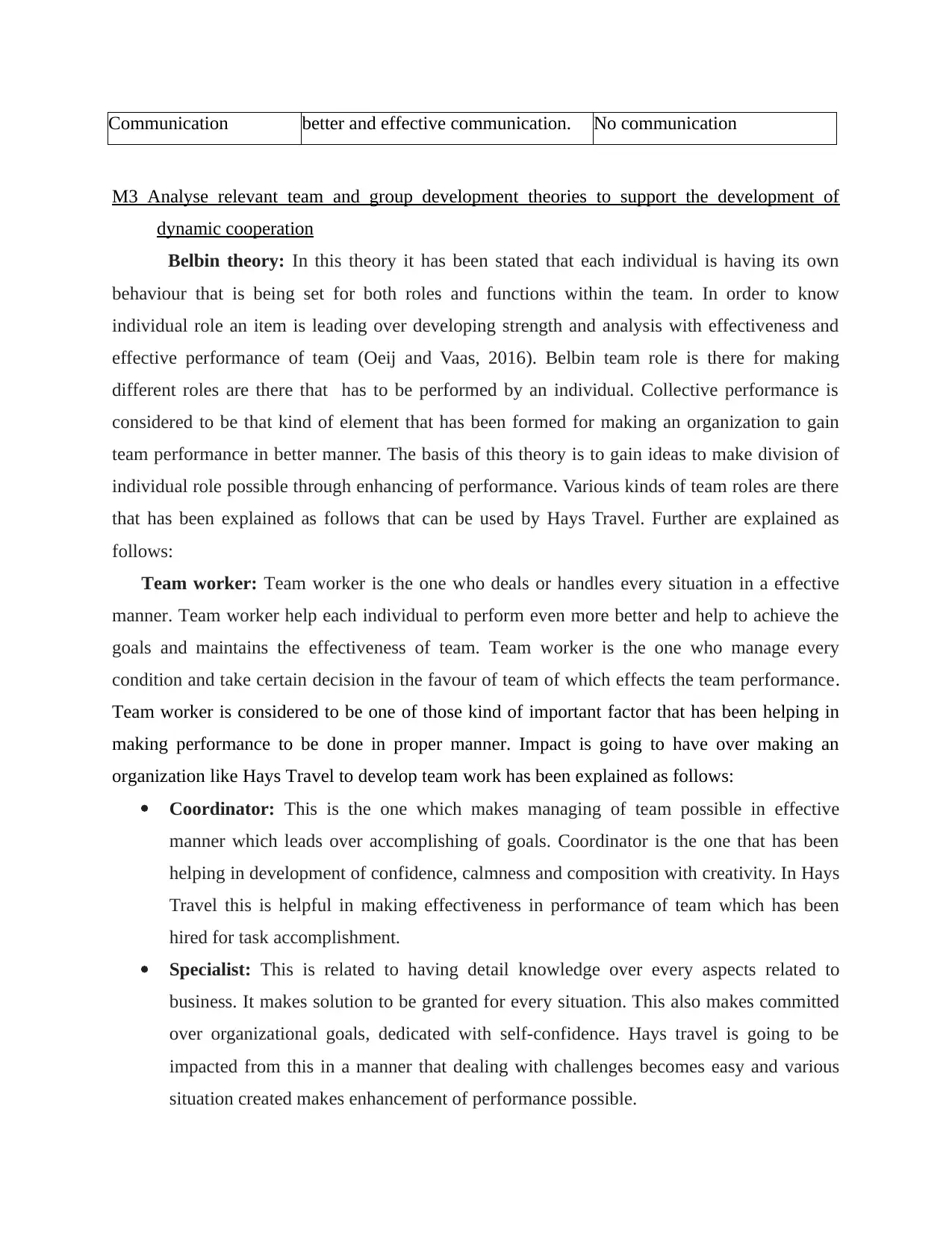
Communication better and effective communication. No communication
M3 Analyse relevant team and group development theories to support the development of
dynamic cooperation
Belbin theory: In this theory it has been stated that each individual is having its own
behaviour that is being set for both roles and functions within the team. In order to know
individual role an item is leading over developing strength and analysis with effectiveness and
effective performance of team (Oeij and Vaas, 2016). Belbin team role is there for making
different roles are there that has to be performed by an individual. Collective performance is
considered to be that kind of element that has been formed for making an organization to gain
team performance in better manner. The basis of this theory is to gain ideas to make division of
individual role possible through enhancing of performance. Various kinds of team roles are there
that has been explained as follows that can be used by Hays Travel. Further are explained as
follows:
Team worker: Team worker is the one who deals or handles every situation in a effective
manner. Team worker help each individual to perform even more better and help to achieve the
goals and maintains the effectiveness of team. Team worker is the one who manage every
condition and take certain decision in the favour of team of which effects the team performance.
Team worker is considered to be one of those kind of important factor that has been helping in
making performance to be done in proper manner. Impact is going to have over making an
organization like Hays Travel to develop team work has been explained as follows:
Coordinator: This is the one which makes managing of team possible in effective
manner which leads over accomplishing of goals. Coordinator is the one that has been
helping in development of confidence, calmness and composition with creativity. In Hays
Travel this is helpful in making effectiveness in performance of team which has been
hired for task accomplishment.
Specialist: This is related to having detail knowledge over every aspects related to
business. It makes solution to be granted for every situation. This also makes committed
over organizational goals, dedicated with self-confidence. Hays travel is going to be
impacted from this in a manner that dealing with challenges becomes easy and various
situation created makes enhancement of performance possible.
M3 Analyse relevant team and group development theories to support the development of
dynamic cooperation
Belbin theory: In this theory it has been stated that each individual is having its own
behaviour that is being set for both roles and functions within the team. In order to know
individual role an item is leading over developing strength and analysis with effectiveness and
effective performance of team (Oeij and Vaas, 2016). Belbin team role is there for making
different roles are there that has to be performed by an individual. Collective performance is
considered to be that kind of element that has been formed for making an organization to gain
team performance in better manner. The basis of this theory is to gain ideas to make division of
individual role possible through enhancing of performance. Various kinds of team roles are there
that has been explained as follows that can be used by Hays Travel. Further are explained as
follows:
Team worker: Team worker is the one who deals or handles every situation in a effective
manner. Team worker help each individual to perform even more better and help to achieve the
goals and maintains the effectiveness of team. Team worker is the one who manage every
condition and take certain decision in the favour of team of which effects the team performance.
Team worker is considered to be one of those kind of important factor that has been helping in
making performance to be done in proper manner. Impact is going to have over making an
organization like Hays Travel to develop team work has been explained as follows:
Coordinator: This is the one which makes managing of team possible in effective
manner which leads over accomplishing of goals. Coordinator is the one that has been
helping in development of confidence, calmness and composition with creativity. In Hays
Travel this is helpful in making effectiveness in performance of team which has been
hired for task accomplishment.
Specialist: This is related to having detail knowledge over every aspects related to
business. It makes solution to be granted for every situation. This also makes committed
over organizational goals, dedicated with self-confidence. Hays travel is going to be
impacted from this in a manner that dealing with challenges becomes easy and various
situation created makes enhancement of performance possible.
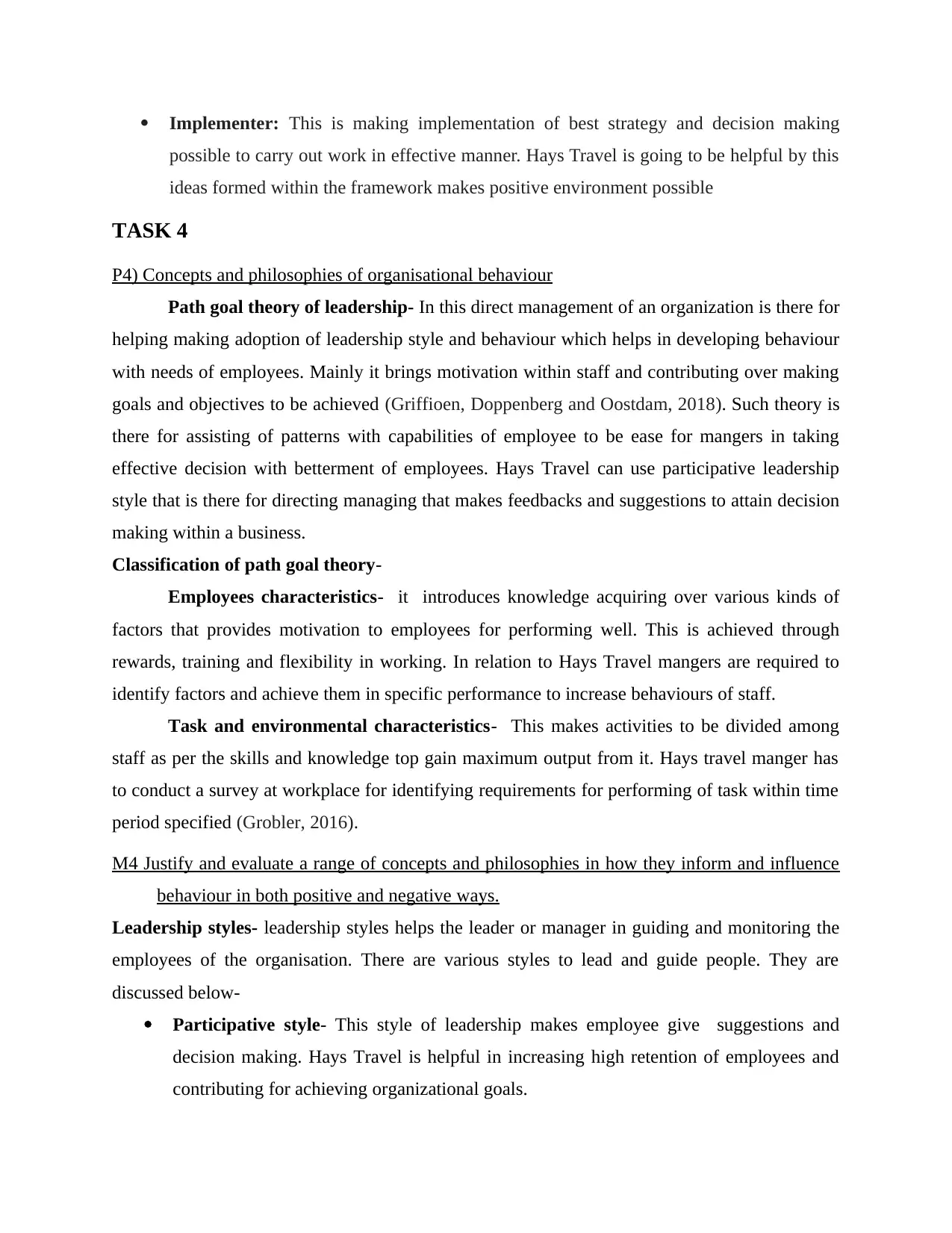
Implementer: This is making implementation of best strategy and decision making
possible to carry out work in effective manner. Hays Travel is going to be helpful by this
ideas formed within the framework makes positive environment possible
TASK 4
P4) Concepts and philosophies of organisational behaviour
Path goal theory of leadership- In this direct management of an organization is there for
helping making adoption of leadership style and behaviour which helps in developing behaviour
with needs of employees. Mainly it brings motivation within staff and contributing over making
goals and objectives to be achieved (Griffioen, Doppenberg and Oostdam, 2018). Such theory is
there for assisting of patterns with capabilities of employee to be ease for mangers in taking
effective decision with betterment of employees. Hays Travel can use participative leadership
style that is there for directing managing that makes feedbacks and suggestions to attain decision
making within a business.
Classification of path goal theory-
Employees characteristics- it introduces knowledge acquiring over various kinds of
factors that provides motivation to employees for performing well. This is achieved through
rewards, training and flexibility in working. In relation to Hays Travel mangers are required to
identify factors and achieve them in specific performance to increase behaviours of staff.
Task and environmental characteristics- This makes activities to be divided among
staff as per the skills and knowledge top gain maximum output from it. Hays travel manger has
to conduct a survey at workplace for identifying requirements for performing of task within time
period specified (Grobler, 2016).
M4 Justify and evaluate a range of concepts and philosophies in how they inform and influence
behaviour in both positive and negative ways.
Leadership styles- leadership styles helps the leader or manager in guiding and monitoring the
employees of the organisation. There are various styles to lead and guide people. They are
discussed below-
Participative style- This style of leadership makes employee give suggestions and
decision making. Hays Travel is helpful in increasing high retention of employees and
contributing for achieving organizational goals.
possible to carry out work in effective manner. Hays Travel is going to be helpful by this
ideas formed within the framework makes positive environment possible
TASK 4
P4) Concepts and philosophies of organisational behaviour
Path goal theory of leadership- In this direct management of an organization is there for
helping making adoption of leadership style and behaviour which helps in developing behaviour
with needs of employees. Mainly it brings motivation within staff and contributing over making
goals and objectives to be achieved (Griffioen, Doppenberg and Oostdam, 2018). Such theory is
there for assisting of patterns with capabilities of employee to be ease for mangers in taking
effective decision with betterment of employees. Hays Travel can use participative leadership
style that is there for directing managing that makes feedbacks and suggestions to attain decision
making within a business.
Classification of path goal theory-
Employees characteristics- it introduces knowledge acquiring over various kinds of
factors that provides motivation to employees for performing well. This is achieved through
rewards, training and flexibility in working. In relation to Hays Travel mangers are required to
identify factors and achieve them in specific performance to increase behaviours of staff.
Task and environmental characteristics- This makes activities to be divided among
staff as per the skills and knowledge top gain maximum output from it. Hays travel manger has
to conduct a survey at workplace for identifying requirements for performing of task within time
period specified (Grobler, 2016).
M4 Justify and evaluate a range of concepts and philosophies in how they inform and influence
behaviour in both positive and negative ways.
Leadership styles- leadership styles helps the leader or manager in guiding and monitoring the
employees of the organisation. There are various styles to lead and guide people. They are
discussed below-
Participative style- This style of leadership makes employee give suggestions and
decision making. Hays Travel is helpful in increasing high retention of employees and
contributing for achieving organizational goals.
Secure Best Marks with AI Grader
Need help grading? Try our AI Grader for instant feedback on your assignments.
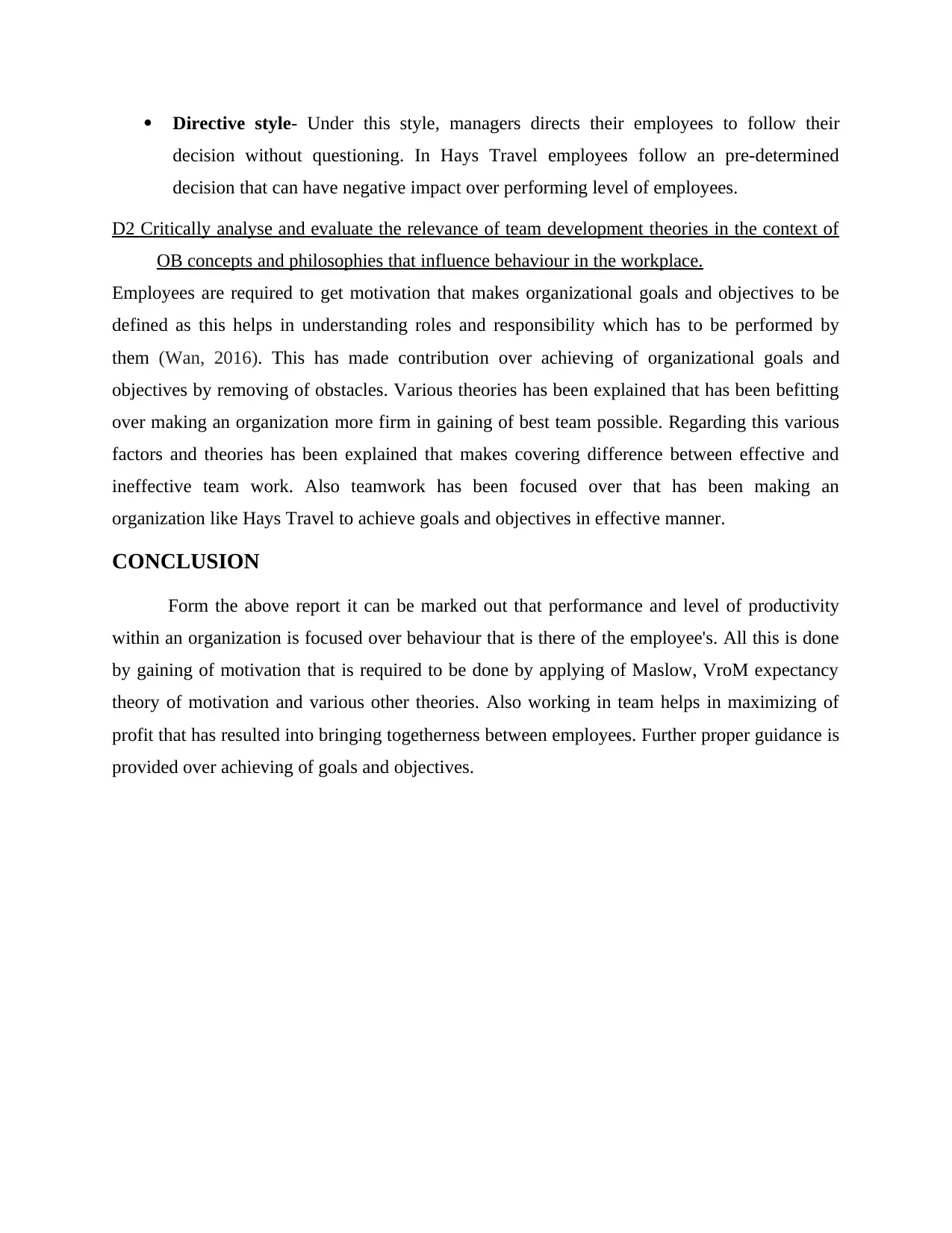
Directive style- Under this style, managers directs their employees to follow their
decision without questioning. In Hays Travel employees follow an pre-determined
decision that can have negative impact over performing level of employees.
D2 Critically analyse and evaluate the relevance of team development theories in the context of
OB concepts and philosophies that influence behaviour in the workplace.
Employees are required to get motivation that makes organizational goals and objectives to be
defined as this helps in understanding roles and responsibility which has to be performed by
them (Wan, 2016). This has made contribution over achieving of organizational goals and
objectives by removing of obstacles. Various theories has been explained that has been befitting
over making an organization more firm in gaining of best team possible. Regarding this various
factors and theories has been explained that makes covering difference between effective and
ineffective team work. Also teamwork has been focused over that has been making an
organization like Hays Travel to achieve goals and objectives in effective manner.
CONCLUSION
Form the above report it can be marked out that performance and level of productivity
within an organization is focused over behaviour that is there of the employee's. All this is done
by gaining of motivation that is required to be done by applying of Maslow, VroM expectancy
theory of motivation and various other theories. Also working in team helps in maximizing of
profit that has resulted into bringing togetherness between employees. Further proper guidance is
provided over achieving of goals and objectives.
decision without questioning. In Hays Travel employees follow an pre-determined
decision that can have negative impact over performing level of employees.
D2 Critically analyse and evaluate the relevance of team development theories in the context of
OB concepts and philosophies that influence behaviour in the workplace.
Employees are required to get motivation that makes organizational goals and objectives to be
defined as this helps in understanding roles and responsibility which has to be performed by
them (Wan, 2016). This has made contribution over achieving of organizational goals and
objectives by removing of obstacles. Various theories has been explained that has been befitting
over making an organization more firm in gaining of best team possible. Regarding this various
factors and theories has been explained that makes covering difference between effective and
ineffective team work. Also teamwork has been focused over that has been making an
organization like Hays Travel to achieve goals and objectives in effective manner.
CONCLUSION
Form the above report it can be marked out that performance and level of productivity
within an organization is focused over behaviour that is there of the employee's. All this is done
by gaining of motivation that is required to be done by applying of Maslow, VroM expectancy
theory of motivation and various other theories. Also working in team helps in maximizing of
profit that has resulted into bringing togetherness between employees. Further proper guidance is
provided over achieving of goals and objectives.
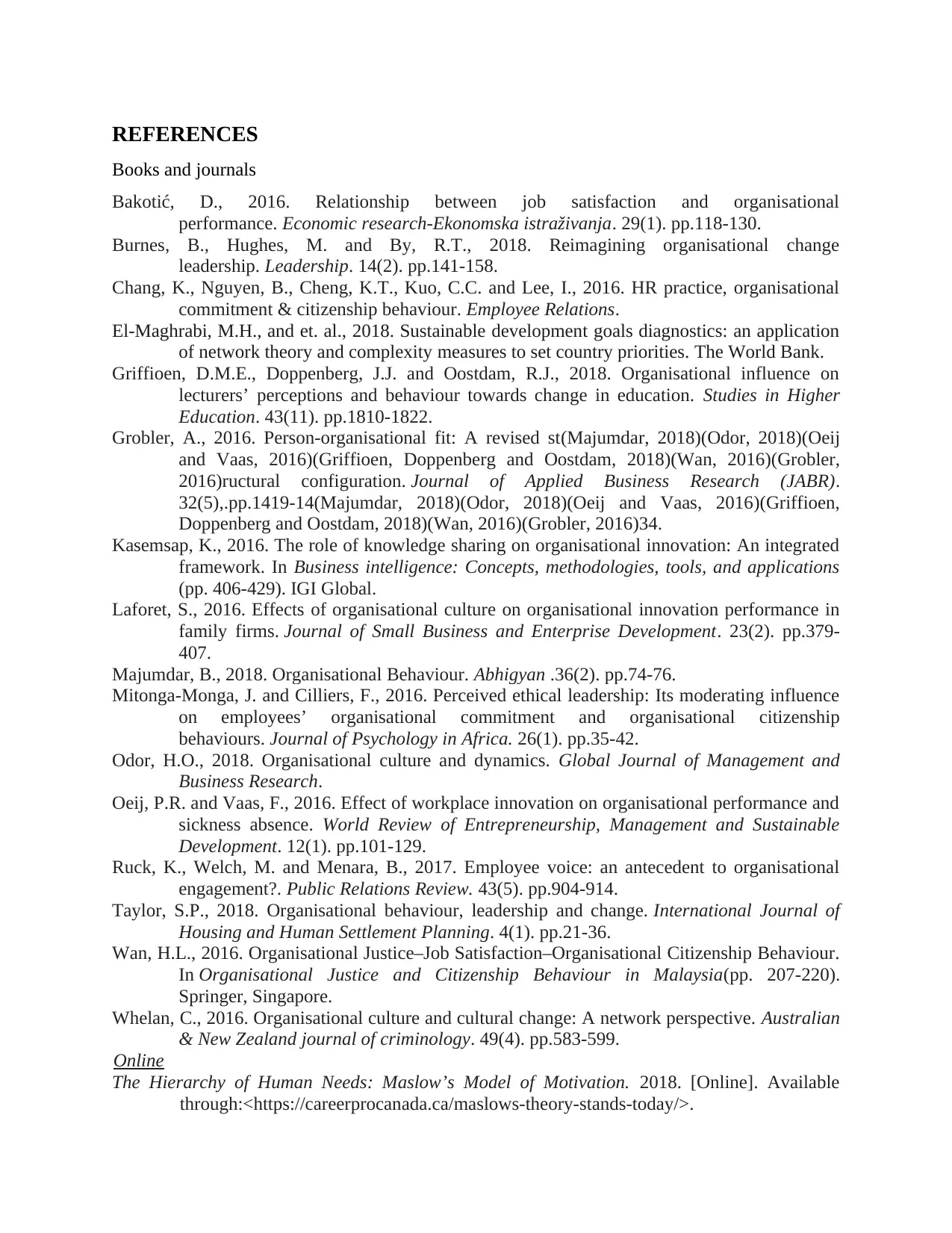
REFERENCES
Books and journals
Bakotić, D., 2016. Relationship between job satisfaction and organisational
performance. Economic research-Ekonomska istraživanja. 29(1). pp.118-130.
Burnes, B., Hughes, M. and By, R.T., 2018. Reimagining organisational change
leadership. Leadership. 14(2). pp.141-158.
Chang, K., Nguyen, B., Cheng, K.T., Kuo, C.C. and Lee, I., 2016. HR practice, organisational
commitment & citizenship behaviour. Employee Relations.
El-Maghrabi, M.H., and et. al., 2018. Sustainable development goals diagnostics: an application
of network theory and complexity measures to set country priorities. The World Bank.
Griffioen, D.M.E., Doppenberg, J.J. and Oostdam, R.J., 2018. Organisational influence on
lecturers’ perceptions and behaviour towards change in education. Studies in Higher
Education. 43(11). pp.1810-1822.
Grobler, A., 2016. Person-organisational fit: A revised st(Majumdar, 2018)(Odor, 2018)(Oeij
and Vaas, 2016)(Griffioen, Doppenberg and Oostdam, 2018)(Wan, 2016)(Grobler,
2016)ructural configuration. Journal of Applied Business Research (JABR).
32(5),.pp.1419-14(Majumdar, 2018)(Odor, 2018)(Oeij and Vaas, 2016)(Griffioen,
Doppenberg and Oostdam, 2018)(Wan, 2016)(Grobler, 2016)34.
Kasemsap, K., 2016. The role of knowledge sharing on organisational innovation: An integrated
framework. In Business intelligence: Concepts, methodologies, tools, and applications
(pp. 406-429). IGI Global.
Laforet, S., 2016. Effects of organisational culture on organisational innovation performance in
family firms. Journal of Small Business and Enterprise Development. 23(2). pp.379-
407.
Majumdar, B., 2018. Organisational Behaviour. Abhigyan .36(2). pp.74-76.
Mitonga-Monga, J. and Cilliers, F., 2016. Perceived ethical leadership: Its moderating influence
on employees’ organisational commitment and organisational citizenship
behaviours. Journal of Psychology in Africa. 26(1). pp.35-42.
Odor, H.O., 2018. Organisational culture and dynamics. Global Journal of Management and
Business Research.
Oeij, P.R. and Vaas, F., 2016. Effect of workplace innovation on organisational performance and
sickness absence. World Review of Entrepreneurship, Management and Sustainable
Development. 12(1). pp.101-129.
Ruck, K., Welch, M. and Menara, B., 2017. Employee voice: an antecedent to organisational
engagement?. Public Relations Review. 43(5). pp.904-914.
Taylor, S.P., 2018. Organisational behaviour, leadership and change. International Journal of
Housing and Human Settlement Planning. 4(1). pp.21-36.
Wan, H.L., 2016. Organisational Justice–Job Satisfaction–Organisational Citizenship Behaviour.
In Organisational Justice and Citizenship Behaviour in Malaysia(pp. 207-220).
Springer, Singapore.
Whelan, C., 2016. Organisational culture and cultural change: A network perspective. Australian
& New Zealand journal of criminology. 49(4). pp.583-599.
Online
The Hierarchy of Human Needs: Maslow’s Model of Motivation. 2018. [Online]. Available
through:<https://careerprocanada.ca/maslows-theory-stands-today/>.
Books and journals
Bakotić, D., 2016. Relationship between job satisfaction and organisational
performance. Economic research-Ekonomska istraživanja. 29(1). pp.118-130.
Burnes, B., Hughes, M. and By, R.T., 2018. Reimagining organisational change
leadership. Leadership. 14(2). pp.141-158.
Chang, K., Nguyen, B., Cheng, K.T., Kuo, C.C. and Lee, I., 2016. HR practice, organisational
commitment & citizenship behaviour. Employee Relations.
El-Maghrabi, M.H., and et. al., 2018. Sustainable development goals diagnostics: an application
of network theory and complexity measures to set country priorities. The World Bank.
Griffioen, D.M.E., Doppenberg, J.J. and Oostdam, R.J., 2018. Organisational influence on
lecturers’ perceptions and behaviour towards change in education. Studies in Higher
Education. 43(11). pp.1810-1822.
Grobler, A., 2016. Person-organisational fit: A revised st(Majumdar, 2018)(Odor, 2018)(Oeij
and Vaas, 2016)(Griffioen, Doppenberg and Oostdam, 2018)(Wan, 2016)(Grobler,
2016)ructural configuration. Journal of Applied Business Research (JABR).
32(5),.pp.1419-14(Majumdar, 2018)(Odor, 2018)(Oeij and Vaas, 2016)(Griffioen,
Doppenberg and Oostdam, 2018)(Wan, 2016)(Grobler, 2016)34.
Kasemsap, K., 2016. The role of knowledge sharing on organisational innovation: An integrated
framework. In Business intelligence: Concepts, methodologies, tools, and applications
(pp. 406-429). IGI Global.
Laforet, S., 2016. Effects of organisational culture on organisational innovation performance in
family firms. Journal of Small Business and Enterprise Development. 23(2). pp.379-
407.
Majumdar, B., 2018. Organisational Behaviour. Abhigyan .36(2). pp.74-76.
Mitonga-Monga, J. and Cilliers, F., 2016. Perceived ethical leadership: Its moderating influence
on employees’ organisational commitment and organisational citizenship
behaviours. Journal of Psychology in Africa. 26(1). pp.35-42.
Odor, H.O., 2018. Organisational culture and dynamics. Global Journal of Management and
Business Research.
Oeij, P.R. and Vaas, F., 2016. Effect of workplace innovation on organisational performance and
sickness absence. World Review of Entrepreneurship, Management and Sustainable
Development. 12(1). pp.101-129.
Ruck, K., Welch, M. and Menara, B., 2017. Employee voice: an antecedent to organisational
engagement?. Public Relations Review. 43(5). pp.904-914.
Taylor, S.P., 2018. Organisational behaviour, leadership and change. International Journal of
Housing and Human Settlement Planning. 4(1). pp.21-36.
Wan, H.L., 2016. Organisational Justice–Job Satisfaction–Organisational Citizenship Behaviour.
In Organisational Justice and Citizenship Behaviour in Malaysia(pp. 207-220).
Springer, Singapore.
Whelan, C., 2016. Organisational culture and cultural change: A network perspective. Australian
& New Zealand journal of criminology. 49(4). pp.583-599.
Online
The Hierarchy of Human Needs: Maslow’s Model of Motivation. 2018. [Online]. Available
through:<https://careerprocanada.ca/maslows-theory-stands-today/>.
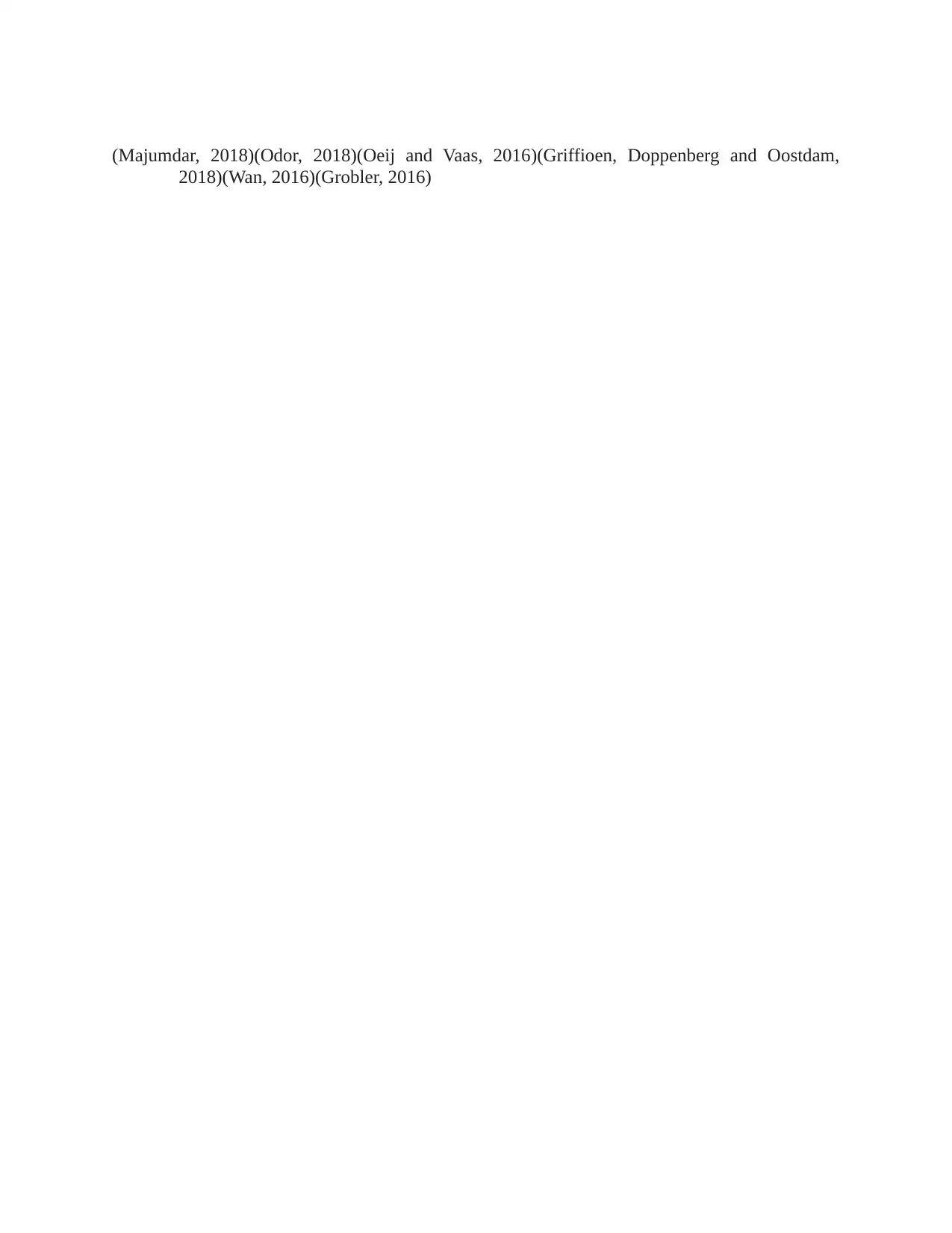
(Majumdar, 2018)(Odor, 2018)(Oeij and Vaas, 2016)(Griffioen, Doppenberg and Oostdam,
2018)(Wan, 2016)(Grobler, 2016)
2018)(Wan, 2016)(Grobler, 2016)
1 out of 19
Related Documents
Your All-in-One AI-Powered Toolkit for Academic Success.
+13062052269
info@desklib.com
Available 24*7 on WhatsApp / Email
![[object Object]](/_next/static/media/star-bottom.7253800d.svg)
Unlock your academic potential
© 2024 | Zucol Services PVT LTD | All rights reserved.



